汉语的动词和副词英文版
汉语和英语的词性

汉语和英语的词性公司内部档案编码:[OPPTR-OPPT28-OPPTL98-OPPNN08]性指作为划分词类的根据的词的特点。
现代汉语的词可以分为12类。
实词:名词、动词、形容词、数词、量词和代词。
虚词:副词、介词、连词、助词、拟声词和叹词。
一.名词二.表示人和事物的名称叫名词。
如:"黄瓜、猪、羊、白菜、拖拉机、计算机"。
1、表示专用名称的叫做"专用名词",如"云南、上海、李白、白居易,中国"。
2、表示抽象事物的名称的叫做"抽象名词",如"范畴、思想、质量、品德、品质、友谊、方法"。
3、表示方位的叫做"方位名词",如"上""下""左""右""前""后""中""东""西""南""北""前面""后边""东边""南面""中间"等。
三.四.动词五.动词表示人或事物的动作、行为、发展、变化。
1、有的动词表示一般的动作,如"来、去、说、走、跑、吼、叫、学习、起飞、审查、认识"等。
2、有的动词表示心理活动,如"想、重视、注重、尊敬、了解、相信、佩服、惦念"等,这样的动词前面往往可以加上"很、十分"。
3、有的动词表示能够、愿意这些意思,叫做"能愿动词",它们是"能、要、应、肯、敢、得(dei)、能够、应该、应当、愿意、可以、可能、必须",这些能愿动词常常用在一般的动词前面,如"得去、能够做、可以考虑、愿意学习、应该说明、可能发展"。
汉语动词的英译完整版

汉语动词的英译集团标准化办公室:[VV986T-J682P28-JP266L8-68PNN]汉语动词的英译英汉两种语言在使用习惯和语言结构上有很大的差异,翻译的方法与技巧就是建立在这些差异的理论研究基础上总结而来的。
翻译实践证明凡是英汉相同之处,一般比较容易对译,英汉不同之处却很难互译。
一旦找出英汉不同之处及其表达方式的差异,难译的问题便迎刃而解了。
下面就从英汉动词的差异入手,谈谈汉译英时如何翻译动词这一问题。
英汉语对动词所下的定义是一样的,即表示人或事物的动作、行为、发展、变化的词叫做动词。
汉语动词没有曲折的形态变化,使用时不受形态上的限制,比较方便。
现代汉语句法一个显着的特征是“动词连用”的现象。
现代汉语一动词站优势,一个句子不限于只用一个动词,可以连续使用几个动词。
而英语动词有比较丰富的时态变化,但动词的使用范围没有汉语广。
因此,汉语动词在英译时要注意动词的形态变化,并灵活的进行省译或转译。
(一)汉语动词译为英语动词的某种形态英语的动词是各种词类中最为活跃、变化最多的词类,汉语动词的多样性无法与之相比。
仅从语法范畴来看,英语动词具有时、数、体、态和人称等范畴,而汉语中的动词本身并不完全具有以上范畴,往往需要借助其它词汇或语境体现。
汉语动词在在英译过程中仍用动词表达时,要注意动词的形态变化。
1、爬山很有趣。
Climbing mountainsisinteresting.2、教你真难。
Toteach youisdifficult.3、他每天早上七点起床。
He getsup at7:00everymorning。
4、门锁好了。
Thedoor hasbeenlockedup.5、我借这本书好几天了。
I havekept thebookforquiteafewdays.(二)汉语动词省译因为英语动词的使用范围较窄,受限制比较大,所以汉语动词在英译的过程中,可以根据具体情况巧妙地进行省译。
1、我来跟你父母谈。
2024新人教版七年级上册英语Starter Unit 1知识点梳理及语法讲义(教师版)
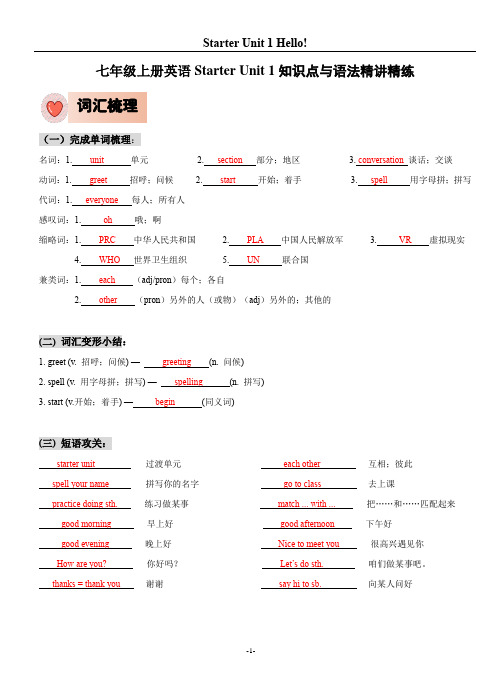
七年级上册英语Starter Unit 1知识点与语法精讲精练词汇梳理(一)完成单词梳理:名词:1. unit单元 2. section 部分;地区 3. conversation 谈话;交谈动词:1. greet 招呼;问候 2. start 开始;着手 3. spell 用字母拼;拼写代词:1. everyone 每人;所有人感叹词:1. oh 哦;啊缩略词:1. PRC 中华人民共和国 2. PLA 中国人民解放军 3. VR 虚拟现实4. WHO 世界卫生组织5. UN 联合国兼类词:1. each (adj/pron)每个;各自2. other (pron)另外的人(或物)(adj)另外的;其他的(二) 词汇变形小结:1. greet (v. 招呼;问候) — greeting (n. 问候)2. spell (v. 用字母拼;拼写) — spelling (n. 拼写)3. start (v.开始;着手) — begin (同义词)(三) 短语攻关:starter unit 过渡单元each other 互相;彼此spell your name 拼写你的名字go to class 去上课practice doing sth. 练习做某事match ... with ... 把……和……匹配起来good morning 早上好good afternoon 下午好good evening 晚上好Nice to meet you 很高兴遇见你How are you? 你好吗?Let’s do sth. 咱们做某事吧。
thanks = thank you 谢谢say hi to sb. 向某人问好1. 26个英文字母【用法详解】1. 重点:英语中一共有26 个英文字母,其中包括 5 个元音字母(Aa 、Ee 、Ii 、Oo 、Uu )和21个辅音字母。
2.大写字母的基本用法:(1)句子的开头;Eg.I went to the store yesterday. 我昨天去商店了。
词语学习简单的动词和副词
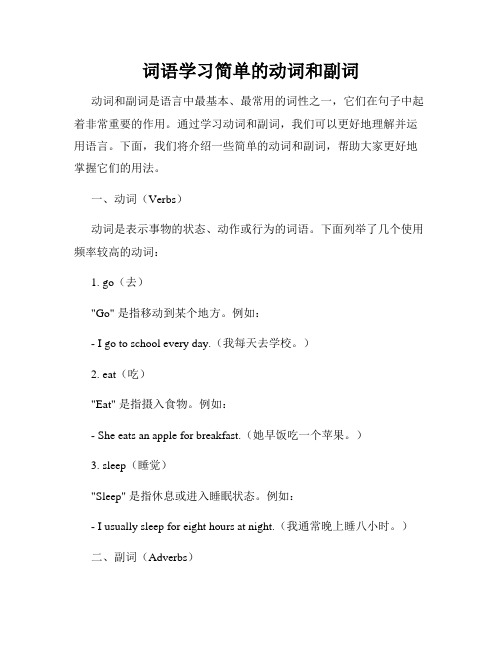
词语学习简单的动词和副词动词和副词是语言中最基本、最常用的词性之一,它们在句子中起着非常重要的作用。
通过学习动词和副词,我们可以更好地理解并运用语言。
下面,我们将介绍一些简单的动词和副词,帮助大家更好地掌握它们的用法。
一、动词(Verbs)动词是表示事物的状态、动作或行为的词语。
下面列举了几个使用频率较高的动词:1. go(去)"Go" 是指移动到某个地方。
例如:- I go to school every day.(我每天去学校。
)2. eat(吃)"Eat" 是指摄入食物。
例如:- She eats an apple for breakfast.(她早饭吃一个苹果。
)3. sleep(睡觉)"Sleep" 是指休息或进入睡眠状态。
例如:- I usually sleep for eight hours at night.(我通常晚上睡八小时。
)二、副词(Adverbs)副词是用来修饰动词、形容词、副词等词语的词类。
它们可以提供关于时间、位置和方式等信息。
以下是几个常见的副词:1. slowly(慢慢地)"Slowly" 是指以缓慢的速度进行。
例如:- She walked slowly across the street.(她慢慢地穿过街道。
)2. quickly(快速地)"Quickly" 是指以快速的速度进行。
例如:- He ate his lunch quickly before the meeting.(他在会议前快速吃完了午饭。
)3. beautifully(美丽地)"Beautifully" 是指以美丽的方式进行。
例如:- The flowers in the garden bloomed beautifully.(花园里的花朵开得很美。
)三、动词和副词的运用动词和副词的运用能够丰富语言表达,使句子更加准确和生动。
动词,名词,代词,形容词,副词,冠词
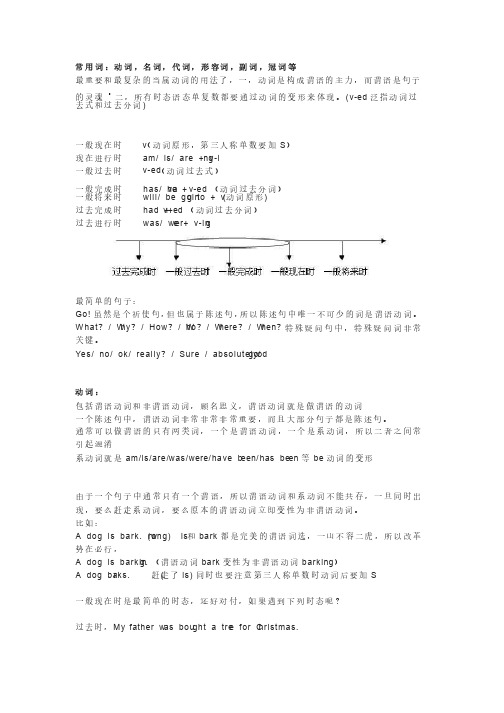
常用词:动词,名词,代词,形容词,副词,冠词等最重要和最复杂的当属动词的用法了,一,动词是构成谓语的主力,而谓语是句子的灵魂二,所有时态语态单复数都要通过动词的变形来体现。
(v-ed 泛指动词过去式和过去分词)一般现在时 v (动词原形,第三人称单数要加S )现在进行时 am/ is/ are + v-ing 一般过去时 v-ed (动词过去式)一般完成时 has/ ha ve + v-e d (动词过去分词) 一般将来时 will/ be going to + v (动词原形) 过去完成时 had + v+ed (动词过去分词) 过去进行时 was/ were + v-in g最简单的句子: Go ! 虽然是个祈使句,但也属于陈述句,所以陈述句中唯一不可少的词是谓语动词。
W hat? / W hy? / How? / W h o? / Who? / W here ? / W hen? 特殊疑问句中,特殊疑问词非常关键。
Yes/ no/ ok/ really? / Sure / absolutely/ go od 动词:包括谓语动词和非谓语动词,顾名思义,谓语动词就是做谓语的动词一个陈述句中,谓语动词非常非常非常重要,而且大部分句子都是陈述句。
通常可以做谓语的只有两类词,一个是谓语动词,一个是系动词,所以二者之间常引起混淆系动词就是am/is/are/was/w ere/ha ve b een/has be en 等be 动词的变形由于一个句子中通常只有一个谓语,所以谓语动词和系动词不能共存,一旦同时出现,要么赶走系动词,要么原本的谓语动词立即变性为非谓语动词。
比如:A dog is bark. (w ro ng) is 和ba rk 都是完美的谓语词选,一山不容二虎,所以改革势在必行,A dog is barkin g. (谓语动词ba rk 变性为非谓语动词b arkin g )A dog ba rks. (赶走了is) 同时也要注意第三人称单数时动词后要加S一般现在时是最简单的时态,还好对付,如果遇到下列时态呢?过去时,M y fath er w as bou ght a tree for C hristmas. 这时,被动语态会被无辜牵连进来,因为被动语态的构成为b e+v-ed过去时中动词全部是v-e d形式出现,不规则动词除外,很容易让人联想到被动语态。
英语形容词,副词及动词短语
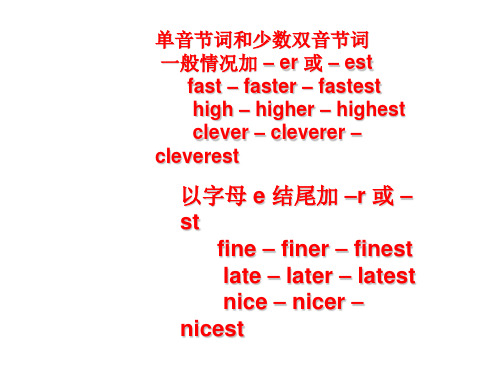
专题八
动词分类及动词短语
3.must和have to
(1)must 意为“必须,应该,一定,准是”,表示说话人 认为有必要做某事,或命令、要求别人做某事以及对事物的推 测。如:He must be working in his office. 他一定在办公室工 作呢。 (2)must 和 have to 的区别: must 表示说话人的主观意愿; have to 表示客观需要。如: I must do my homework first. 我必须首先做家庭作业。
┃助动词┃ 协助主要动词构成谓语动词的词叫助动词。助动词是语法 功能词,自身没有词义,不可单独使用。 1.帮助构成疑问句或否定句句式的助动词有do, does, did 及其否定形式。如: Did you go home last week? 上周你回家了吗?
2.帮助构成时态的助动词有be, have, shall, will等。如:
• 部分双音节和多音节词 • 在词前加 more 或 most • slowly - more slowly - most slowly • easily - more easily - most easily • carefully - more carefully • - most carefully
5.shall 和will
shall用于第一人称的句子表示提建议或请求; will用于第 二人称疑问句表示征求意见或提建议。如: Shall we go out for a walk? 我们出去散步好吗? Will you go shopping with us? 你要不要和我们一起去购物啊?
• 掌握几种同义句转换 • 1. He is taller than any other student in his class. • = He is taller than the other students in his class. • = He is taller than any of the other students in his class. • = He is the tallest (student)in his class
(完整word版)初中英语动词表

(完整word版)初中英语动词表初中英语动词accept 接受act 行动add增加admire 羡慕advice/se 建议afford负担得起agree同意;赞成allow允许am是(be)amaze使…惊愕annoy 烦扰answer回答apologize 道歉appear出现;露面appreciate欣赏are是(be)argue 争辩arrive到达;抵达ask问attack进攻;袭击attract吸引avoid避免 22bake烘烤bang猛敲;砰砰声base以…为基础be(am,is, are :was, were been being)是,就是,表示,成为;(还作助动词用)bear 证明出生beat敲打;打败become变成;成为beg乞求:恳求begin开始:着手believe相信belong 属于bite咬bloom开花blow吹,刮boil 沸腾book 预定bore令人烦borrow借进brake 刹车break打破,折断;课间休息breathe呼吸bring带来;拿来broke打破(过去式) brush 刷洗build建造bury埋葬buy购买 27call打电话,叫喊can能;可以;会canoe乘独木舟care关心,照顾carry携带,搬运, 送carve雕刻catch捉,抓住cause引起celebrate庆祝change变换,改变chant唱诵check检查cheer欢呼choose选择circle环绕classify分类clean打扫clear 清除climb爬close关闭collapse倒塌collect收集color给…着色come来compare比较compete竞争complain抱怨complete完成congratulate祝贺connect连接continue继续cook烹调copy抄写,誊写;复制correct改正cost价钱为…,花费cough咳嗽could可以…;行; count数;点数cover覆盖crash坠毁;冲撞cross跨越,横跨crow叫,鸣叫crowd拥挤cry哭;叫喊cut切,砍 45 dance跳舞dare敢于decide决定decorate装修;修饰delay延误delete 删除describe描述;叙述deserve值得,应得design 设计develop发展dial拨(电话)die死亡dig挖disappear消失discover发现;发觉discuss讨论dislike不喜欢,厌恶disturb妨碍;打扰dive潜水dividedo做;(助动词) double加倍download下载draw画dream做梦drink喝drive驾驶drop掉下,落下drown淹死dry把…弄干 30 eat吃educate 教育elect选举empty倒空,清空encourage鼓励end结束enjoy喜欢enlarge 扩大enter进入escape逃跑excuse原谅exhibit展览expect期望explain 解释explore探测 15 face 面对fail失败fall倒下farm 耕种fasten 系牢fear害怕feed喂养feel感觉fetch去拿来fight 打架fill装,填find发现:找到finish完成fire 解雇开火fish钓鱼fit使...适合,适合fix 固定解决flash 闪flood淹没flow 流fly飞;乘飞机去;放(风筝)follow跟随fool 愚弄force 强迫forget忘记forgive 原谅form构成,组成found成立;建立freeze结冰;凝固frighten吓唬,恫吓frustrate使..沮丧31gather 聚集get得到;到达give给gleam闪光go去grab攫取;抓取graduate毕业grasp 抓住greet问候,打招呼grow种植;生长; guard 保卫guess猜guide指导,引导 13 hang绞死;悬挂,吊hand 传递happen发生harm伤害harvest收获has有(have) hate讨厌,不喜欢;恨have有;进行head 走向heal使…痊愈hear听见;听说heat 加热help帮助hide躲藏hike远足hit打;撞;击中hold拿;握hope希望host 做东招待hunt 狩猎hurry匆忙hurt使受伤,痛 22 imagine假设imply 暗示improve改善include 包括increase增加inform 通知injure 伤害interview会见,采访introduce介绍invent发明invite邀请is是(be) 12jog 慢跑join参加judge 判断jump跳涨 4keep保持;使得…kick 踢kidnap 绑架kill杀死kiss 吻kneel 下跪knock敲know知道;认识 8 lack 缺乏lag 落后land登陆,降落last 持续laugh大笑launch发动lay下(蛋);产(卵) lead领导,带领learn学;学会learn…by heart背诵leave离开;出发lend借(出)let让lie平躺; 说谎lift (云雾)消散like喜欢limit 限制listen听list 列清单litter扔垃圾live居住;生活load 载lock锁long 渴望look看lose丢失love爱 27mail 发邮件make制造;使…manage 成功的做mark 做记号标记marry结婚master 掌握match匹配matter要紧,有关系may可以mean意思是;意味measure 测量meet会见,遇见memorize 记背mend修理mention提及;说起might 可能mind关心,介意miss想念;错过mistake 误以为mix混合,混和mix up混合model 模仿moor停泊move移动;搬迁multiply乘以must必须 26name 取名need需要nod 点头note 注意记笔记notice注意到nurse 护理 6 organize 组织obey遵守object to 反对observe 遵守观察offer提供omit 省略open打开operate操作;动手术oppose to 反对order订购,ought to 应该overcome 克服overlook 忽视俯瞰oversleep 睡过头owe 欠own 拥有 16 pack打包paddle划水paint 油漆画panic 惊慌pardon原谅park停放(车辆) part 分开pass传递;通过pat 轻拍pay付钱peel削(水果) perform 表演permit 允许pick捡起picnic 野炊pierce 穿透刺穿pity怜悯,同情place 放plan计划plant种植play玩;打please使...高兴point指;指向polish 擦亮pollute污染;弄脏pour倒,灌;倾泻practice/se练习praise夸奖predict预测prefer宁愿;更喜欢prepare 准备present 呈现press压;摁pretend 假装prevent防止print印刷;打印process 加工处理produce生产promise 答应承诺pronounce发音protect保护provide提供pull拉,拽,拖,拔punish 惩罚push推put放 47quarrel争吵question 质疑race 赛跑rain下雨raise 提高reach到达;够着read阅读;读realize察觉;领悟;了解recall 回忆receive接收;收到;得到recite 背诵record 记录recycle再循环;回收利用reflect 反射refuse拒绝regard看待;当作regret 遗憾后悔relax放松remain 保持remember记得remind 使想起renew 续借repair修理repeat 重复reply回复report报导request 请求require 要求rest 休息retell复述return回来;归还review复习rewrite改写ride骑ring铃响;打电话rise升起;上升risk 冒险rob抢劫rock震动,摇动rub擦;磨ruin损坏run跑;运行rush冲;奔跑sail 航行satisfy 使…满意save 节约say说scream 尖叫score 得分search搜查;搜索seat 使…坐下see看见;看望seek 寻找seem好像;似乎select挑选,选择sell卖;售send 发送,寄,派遣sense 感觉到separate 分开serve上(菜),开(饭), 服务set使开始,启程,安放settle 安定shake 摇晃握手shall将shape 成形share分享sharpen 使…锋利shave 刮shine发光;照耀shock 震惊shoot射击;射死shop买东西should将;应该shout呼喊;喊叫show给...看;出示shut关闭sing唱唱歌sink下沉;沉没sit坐skate滑冰;溜冰ski滑雪sleep睡;睡觉slow放慢smell闻,嗅;闻起来smile微笑smoke吸烟snow下雪solve解决;解答sound听起来speak说,讲spell拼写spend花费;度过spill溢出,溅出;洒出spit吐痰,吐唾沫spoil糟蹋spread传播sprout发芽stand站立start开始,着手;出发stay停留(某处);逗留steal偷;窃steer驾驶;掌舵step走;踏,踩stir搅动stop停止store贮存study学习,研究succeed 成功suffer忍受,受痛苦suggest建议suit 适合supply 提供suppose假设surf冲浪surprise使…吃惊sweep扫;扫除swim游泳take拿到;带到;花费,耗费talk说话,谈话taste尝味;有...味道teach教;教书telephone打电话给…tell告诉;吩咐thank感谢think想;思考;认为throw投;扔;抛tie捆扎;系toss掷(硬币)train训练,培养translate翻译trap使陷入困境;设陷阱捕捉travel旅行treat治疗;对待trip绊倒,失误try试(做),试验,努力turn翻转,变得type打字understand v. 理解use用;使用;运用visit访问wag摇摆;摆动wait等候 forwait on伺候wake醒来;叫醒walk走路;散步want想;要warm 温暖warn警告;提醒was是(be)wash洗漱;洗waste浪费watch观看water浇水water-ski做滑水运动wave 挥手wear穿着weigh称…的重量welcome欢迎were是(be)will将要win赢,获胜wipe 扫wish 希望wonder惊奇,惊讶; 对…感到怀疑work工作worry担心,使…担心would将,愿意write写zip 拉拉链 1。
小学英语单词表-_带音标、词性、中文翻译和短语
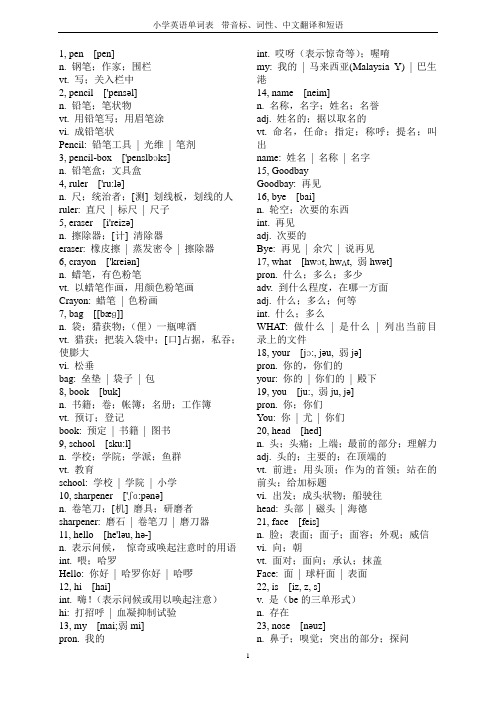
1, pen [pen]n. 钢笔;作家;围栏vt. 写;关入栏中2, pencil ['pensəl]n. 铅笔;笔状物vt. 用铅笔写;用眉笔涂vi. 成铅笔状Pencil: 铅笔工具| 光维| 笔剂3, pencil-box ['penslbɔks]n. 铅笔盒;文具盒4, ruler ['ru:lə]n. 尺;统治者;[测] 划线板,划线的人ruler: 直尺| 标尺| 尺子5, eraser [i'reizə]n. 擦除器;[计] 清除器eraser: 橡皮擦| 蒸发密令| 擦除器6, crayon ['kreiən]n. 蜡笔,有色粉笔vt. 以蜡笔作画,用颜色粉笔画Crayon: 蜡笔| 色粉画7, bag [[bæɡ]]n. 袋;猎获物;(俚)一瓶啤酒vt. 猎获;把装入袋中;[口]占据,私吞;使膨大vi. 松垂bag: 垒垫| 袋子| 包8, book [buk]n. 书籍;卷;帐簿;名册;工作簿vt. 预订;登记book: 预定| 书籍| 图书9, school [sku:l]n. 学校;学院;学派;鱼群vt. 教育school: 学校| 学院| 小学10, sharpener ['ʃɑ:pənə]n. 卷笔刀;[机] 磨具;研磨者sharpener: 磨石| 卷笔刀| 磨刀器11, hello [he'ləu, hə-]n. 表示问候,惊奇或唤起注意时的用语int. 喂;哈罗Hello: 你好| 哈罗你好| 哈啰12, hi [hai]int. 嗨!(表示问候或用以唤起注意)hi: 打招呼| 血凝抑制试验13, my [mai;弱mi]pron. 我的int. 哎呀(表示惊奇等);喔唷my: 我的| 马来西亚(Malaysia Y) | 巴生港14, name [neim]n. 名称,名字;姓名;名誉adj. 姓名的;据以取名的vt. 命名,任命;指定;称呼;提名;叫出name: 姓名| 名称| 名字15, GoodbayGoodbay: 再见16, bye [bai]n. 轮空;次要的东西int. 再见adj. 次要的Bye: 再见| 余穴| 说再见17, what [hwɔt, hwʌt, 弱hwət]pron. 什么;多么;多少adv. 到什么程度,在哪一方面adj. 什么;多么;何等int. 什么;多么WHAT: 做什么| 是什么| 列出当前目录上的文件18, your [jɔ:, jəu, 弱jə]pron. 你的,你们的your: 你的| 你们的| 殿下19, you [ju:, 弱ju, jə]pron. 你;你们You: 你| 尤| 你们20, head [hed]n. 头;头痛;上端;最前的部分;理解力adj. 头的;主要的;在顶端的vt. 前进;用头顶;作为的首领;站在的前头;给加标题vi. 出发;成头状物;船驶往head: 头部| 磁头| 海德21, face [feis]n. 脸;表面;面子;面容;外观;威信vi. 向;朝vt. 面对;面向;承认;抹盖Face: 面| 球杆面| 表面22, is [iz, z, s]v. 是(be的三单形式)n. 存在23, nose [nəuz]n. 鼻子;嗅觉;突出的部分;探问1vt. 嗅;用鼻子触vi. 小心探索着前进;探问nose: 鼻子| 机头| 棒前端24, eye [ai]n. 眼睛;视力;眼光;见解,观点vt. 注视,看eye: 针眼| 鸡眼| 登高者25, arm [ɑ:m]n. 手臂;武器;袖子;装备vt. 武装;备战vi. 武装起来arm: 臂部| 摇杆| Advanced RISC Machines26, ear [iə]n. 耳朵;穗;听觉;倾听vi. (美俚)听见;抽穗ear: 耳朵| 平均需要量(Estimated Average Requirement)27, finger ['fiŋɡə]n. 手指;指针,指状物vt. 伸出;用手指拨弄vi. 用指触摸;拨弄finger: 手指| 单指和弦| 指示服务28, leg [leɡ]n. 腿;支柱leg: 直角边| 三角形的直角边| 法律29, foot [fut]n. 脚;英尺;步调;末尾vt. 支付;给换底vi. 步行;跳舞;总计foot: 英尺| 步履| 山脚30, food [fu:d]n. 食物;养料Food: 食品| 食物| 饮食31, body ['bɔdi]n. 身体;主体;大量;团体;主要部分vt. 赋以形体Body: 阀体| 体| 正文32, good [ɡud]n. 好处;善行;慷慨的行为adj. 好的;优良的;愉快的;虔诚的adv. 好Good: 好的| 良好的| 祈祷33, morning ['mɔ:niŋ]n. 早晨;黎明;初期Morning: 早晨| 清晨| 早上34, this [ðis, 弱ðəs]adj. 这;本;这个;今pron. 这;这个;这里adv. 这样地;这么this: 这个| 这| 这个表征35, nice [nais]adj. 精密的;美好的;细微的;和蔼的Nice: 尼斯| 法国尼斯| 英国临床优化研究所36, meet [mi:t]n. 集会vt. 满足;遇见;对付adj. 合适的;适宜的vi. 相遇;接触meet: 相遇| 相交| 遇见37, go [ɡəu]n. 去;进行;尝试vi. 走;达到;运转;趋于vt. 忍受;出产;以打赌GO: 基因本体论(Gene Ontology) | 剩余穴数| 行38, to [强tu:, 弱tu, 辅音前弱tə, t] prep. 到;向;(表示时间、方向)朝方向adv. 向前;(门等)关上to: 汤加| 给| 收信人39, afternoon [,ɑ:ftə:'nu:n, ,æf-, 'ɑ:ftə'nu:n, 'æf-]n. 午后,下午afternoon: 下午| 午后| 午后咖啡40, too [tu:]adv. 太;也;很;还;非常;过度TOO: 小白兔| 也| 太41, red [red]n. 红色,红颜料;赤字adj. 红色的;红肿的,充血的red: 红色| 蓝色的| random early detection42, yellow ['jeləu]n. 黄色;黄种人;黄色颜料adj. 黄色的;黄皮肤的vt. 使变黄或发黄vi. 变黄或发黄yellow: 黄色| 蓝色的| 黄43, green [ɡri:n]n. 绿色;青春adj. 绿色的;青春的2vt. 使变绿色vi. 变绿色green: 绿色| 蓝色的| 格陵河44, blue [blu:]n. 蓝色adj. 蓝色的;忧郁的,沮丧的;下流的vt. 使成蓝色vi. 变蓝Blue: 蓝色橙味糖浆| 黄色| 蓝色的45, purple ['pə:pl]n. 紫色;紫袍adj. 紫色的;帝王的;华而不实的vt. 使成紫色vi. 变成紫色PURPLE: 紫色| 紫色指示剂| 紫色类46, white [hwait]n. 白色;洁白;白种人adj. 白色的;白种的;纯洁的white: 蓝色的| 白河| 全白色图矩阵47, black [blæk]n. 黑色;黑人;黑颜料adj. 黑色的;黑人的;邪恶的vt. 使变黑;把鞋油等涂在上;把(眼眶)打成青肿vi. 变黑black: 黑色| 布莱克| 黑市的48, orange ['ɔrindʒ, 'ɔ:-]n. 橙;橙色;桔子adj. 橙色的;橘色的orange: 橙色| 柑桔| 橙汁49, pink [piŋk]n. 粉红色;化身,典范;石竹花;头面人物adj. 粉红的;比较激进的;石竹科的;脸色发红的vt. 扎,刺,戳;使变粉红色;使面红耳赤vi. 变粉红色pink: 粉红色| 粉红| 石竹花50, brown [braun]n. 褐色,棕色adj. 棕色的,褐色的;太阳晒黑的vt. 使变成褐色vi. 变成褐色brown: 褐色| 咖啡色| 棕色51, how [hau]adv. 如何;多少;多么n. 方法;方式conj. 如何How: 如何| 怎样| 怎么样52, are [强ɑ:, 弱ə]v. 是(be的第二人称单复数现在式)n. 公亩are: 公亩| 元件| Antioxidant Response Element53, fine [fain]n. 罚款adj. 好的;优良的;细小的,精美的;健康的;晴朗的vt. 罚款;澄清adv. 很好地;精巧地fine: 罚款| 精细质量| 罚金54, thank [θæŋk]n. 感谢vt. 感谢int. 谢谢thank: 感谢| 谢谢| 你向周围的人表示感谢55, thanksn. 谢谢(只用复数)int. 谢谢Thanks: 谢谢| 致谢| 感谢56, paint [peint]n. 油漆;颜料;绘画作品vt. 油漆;绘画;装饰;描绘vi. 油漆;绘画paint: 油漆| 涂料| 颜料57, great [ɡreit]n. 大师;大人物;伟人们adj. 伟大的,重大的;极好的,好的;主要的Great: 伟大的| 太好了| 格瑞特58, cat [kæt]n. 猫;猫科动物CAT: 氧化氢酶| 卡特彼勒59, dog [[dɔɡ, dɔ:ɡ]]n. 狗;;[美俚]丑女人;卑鄙的人;(俚)朋友vt. 跟踪;尾随dog: 雄狗| 狗| 赖狗60, monkey ['mʌŋki]n. 猴子;顽童3vt. 嘲弄vi. 胡闹;捣蛋Monkey: 猴子| 起重机小车| 猴61, panda ['pændə]n. 熊猫;猫熊Panda: 熊猫| 熊猫卫士| 熊猫电子62, rabbit ['ræbit]n. 兔子,野兔vt. 让见鬼去吧vi. 猎兔rabbit: 兔子| 兔| 兔牌汽车63, duck [dʌk]n. 鸭子;鸭肉;(英)宝贝儿;零分vt. 躲避;猛按入水vi. 闪避;没入水中DUCK: 帆布| 鸭子| 细帆布64, pig [piɡ]n. 猪;猪肉;警察vi. 生小猪;像猪一样过活Pig: 吊袋| 来自脂肪细胞的磷脂酰肌醇多糖| 猪65, bird [bə:d]n. 鸟;家伙;羽毛球vt. 向喝倒彩;起哄vi. 猎鸟;观察研究野鸟Bird: 波导| 鸟类| 鸟66, bear [bεə]n. 熊vi. 承受;结果实vt. 忍受;具有;支撑Bear: 熊| 看淡股市者| 抛空投机者67, mouse [maus, mauz]n. 鼠标;老鼠;胆小羞怯的人vt. 探出vi. 捕鼠;窥探mouse: 家鼠| 滑鼠| 鼠标68, elephant ['elifənt]n. 象;大号图画纸Elephant: 大象| 象牌手扳葫芦| 巨象69, squirrel ['skwə:rəl, 'skwi-, 'skwʌ-]n. 松鼠;松鼠毛皮vt. 贮藏squirrel: 松鼠| 花鼠| 鼠笼式70, have [hæv, 弱həv, əv, v]aux. 已经vt. 有;让;拿;从事;允许have: 拿着| 花园| 具有71, super ['sju:pə]n. 特级品,特大号;临时雇员adj. 特级的;极好的Super: 极好的| 张明璐| 超级的72, zoo [zu:]n. 动物园Zoo: 动物园| 映画| 动物园的一天73, really ['riəli, 'ri:li]adv. 实际上,事实上;真正地,真实地;真的吗?(表语气)really: 真正地| 十分抱歉| 张74, may [mei]aux. 可能,可以;愿意May: 梅| 可以| 可能75, sure [ʃuə, ʃɔ:]adj. 确信的;可靠的;必定的adv. 当然;的确Sure: 当然| 的确| 确定76, like [laik]prep. 像;如同conj. 好像n. 爱好;同样的人或物adj. 同样的;相似的vt. 喜欢;想;愿意like: 喜欢| 象| 二人要击数相同77, it [it]pron. 它IT: 信息技术(Information Technology) 78, cake [keik]n. 蛋糕;块状物;利益总额vt. 使结块vi. 结成块状cake: 蛋糕| 月饼| 饼79, bread [bred]n. 面包;生计vt. 在上洒面包屑Bread: 面包| 面饱| 面包乐队80, hot dog热狗(面包夹熏红肠)hot dog: 热狗| 红肠面包| 小红肠81, hamburger ['hæmbə:ɡə]n. 汉堡包,汉堡;牛肉饼,肉饼;碎牛肉Hamburger: 汉堡包| 牛肉饼| 汉堡饱82, chicken ['tʃikin]n. 鸡肉;小鸡;胆小鬼,懦夫4adj. 鸡肉的;胆怯的;幼小的chicken: 鸡| 小鸡| 孵化厂中获取小鸡83, French fries法式炸薯条;炸土豆片French fries: 炸薯条| 炸土豆条| 法式炸薯条84, French [frentʃ]n. 法国人;法语adj. 法国的;法语的;法国人的French: 法语| 法兰西人| 法国的85, Coke [kəuk]n. 可口可乐(等于Coca-Cola)coke: 焦炭| 可口可乐| 可乐86, cock [kɔk]n. 公鸡;龙头;雄鸟;头目vt. 使竖起;使耸立;使朝上vi. 翘起;竖起;大摇大摆Cock: 二通| 旋塞阀| 旋塞87, juice [dʒu:s]n. (水果)汁,液;果汁juice: 果汁| 果汁最大| 汁88, milk [milk]n. 牛奶;乳状物vt. 榨取;挤的奶vi. 挤奶Milk: 牛奶| 米尔克| 密耳克河89, water ['wɔ:tə, 'wɔ-]n. 水;海水;雨水;海域,大片的水vt. 使湿;供以水;给浇水vi. 加水;流泪WATER: 水| 水渍牢度| 沃特尔90, tea [ti:]n. 茶叶;茶树;茶点vt. 给沏茶vi. 喝茶;进茶点TEA: 三乙胺(Tri Ethyl Amine)91, coffee ['kɔfi]n. 咖啡;咖啡豆;咖啡色coffee: 咖啡| 咖啡色| 其它类92, some [sʌm, 弱səm, sm]adj. 一些;某一;大约pron. 一些;若干some: 一些| 预知感能| 若干93, and [强ænd, 弱ənd, ən]conj. 和,与;就;而且;但是;然后AND: 逻辑与| 与| 而且94, no [nəu]n. 不;否决票abbr. 数字(number);元素锘(nobelium)的符号adj. 没有;不是adv. 不NO: 一氧化氮(Nitric Oxide) | 关闭调试功能| 不95, can [kæn, kən]aux. 能,可以n. 罐头,开罐器v. 开罐CAN: 总线(Controller Area Network) | 控制器局域网| 广州96, one [wʌn]num. 一;一个n. 一adj. 一的;唯一的pron. 一个人;任何人One: 唯一| 救世主| 一体97, two [tu:]num. 二n. 两个adj. 两个的TWO: 小白兔| 流氓兔| 双打队员98, three [θri:]num. 三n. 三,三个adj. 三的,三个的Three: 荒岛惊魂| 张英俊| 活着的虚伪99, four [fɔ:]num. 四;四个adj. 四的;四个的Four: 四分| 敌人面前的屈辱| 四气缸发动机100, five [faiv]num. 五,五个n. 五,五个;五美元钞票adj. 五的;五个的FIVE: 大家都伤心| 上里亮太| 五子棋101, six [siks]num. 六,六个n. 六,六个SIX: 六代概念车| 手机| 冰山滑雪场102, seven ['sevən]num. 七个,七5n. 七个,七adj. 七的;七个的Seven: 七宗罪| 火线追缉令| 高娅媛103, eight [eit]num. 八;八个;第八n. 八字形adj. 八的EIGHT: 阳光照射的板炕| 六角匙| 八点滚104, nine [nain]num. 九;九个n. 九,九个adj. 九的,九个的NINE: 夏天的童话| 棒球队| 九岁105, ten [ten]num. 十个,十TEN: 中毒性表皮坏死松解症(Toxic Epidermal Necrolysis)106, doll [dɔl]n. 洋娃娃;玩偶;无头脑的美丽女人vt. 把打扮得花枝招展doll: 娃娃| 玩具娃娃| 玩偶107, boat [bəut]n. 小船;轮船vi. 划船boat: 小船| 舟皿| 蒸发皿108, ship [ʃip]n. 船;舰;太空船vt. 运送,乘船;以船运送vi. 上船;乘船旅行;当船员ship: 轮船| 船舶| 船运109, ball [bɔ:l]n. 球;舞会vt. 捏成球形vi. 成团块Ball: 球| 球体| 滚珠110, kite [kait]n. 风筝vi. 使用空头支票;象风筝一样飞;轻快地移动vt. 骗钱;涂改(支票)kite: 风筝| 风筝形| 风筝型111, balloon [bə'lu:n]n. 气球adj. 像气球般鼓起的vt. 使像气球般鼓起;使激增vi. 激增;膨胀如气球Balloon: 迅速增加颜色| 球| 气囊112, car [kɑ:]n. 汽车;车厢car: 车类运动| 汽车| 轿车113, plane [plein]n. 飞机;平面;程度,水平adj. 平的;平面的vt. 刨平;用刨子刨;掠过水面vi. 刨;乘飞机旅行;翱翔Plane: 平面物体| 平面| 刨子114, friend [frend]n. 朋友;助手;赞助者friend: 朋友| 友元| 陈百强115, for [强fɔ:, 弱fə]prep. 为,为了;因为;给;对于;至于;适合于conj. 因为for: 为了| 循环| 循环开始116, happy ['hæpi]adj. 幸福的;高兴的;巧妙的happy: 开心| 快乐的| 可挂式个性指示灯箱117, birthday ['bə:θdei]n. 生日,诞辰;诞生的日子birthday: 生日| 出生日期| 一次生日晚会118, how old几岁how old: 多大年纪| 几岁| 多大119, eat [i:t]vt. 吃,喝;腐蚀;烦扰vi. 进食;腐蚀,侵蚀Eat: 进食| 收取信号| 食品120, how many多少how many: 多少| 有多少| 工作量121, how much多少,多少钱how much: 多少钱| 多少| 多么爱你122, gift [ɡift]n. 礼物;天赋;赠品vt. 赋予;向赠送Gift: 礼品店| 抽奖程序| 赠本123, boy [bɔi]n. 男孩;男人6boy: 男孩| 小弟| 男孩子124, girl [ɡə:l]n. 女孩,姑娘;女儿;女朋友Girl: 女孩| 黑涩会美眉| 女婴125, teacher ['ti:tʃə]n. 教师;导师Teacher: 教员| 老师| 教师篇126, student ['stju:dənt, 'stu:-]n. 学生;学者student: 大学生| 在校学生| 学者127, welcome ['welkəm]n. 欢迎vt. 欢迎adj. 受欢迎的int. 欢迎Welcome: 欢迎| 欢迎光临| 非法入境128, back [bæk]n. 后面;背部;靠背;足球等的后卫;书报等的末尾adj. 后面的;过去的;拖欠的vt. 支持;后退;背书;下赌注adv. 以前;向后地;来回地;上溯vi. 后退;背靠;倒退back: 后卫| 返回| 后幅129, new [nju:, nu:]adj. 新的,新鲜的;更新的;初见的adv. 新近New: 新建| 建立新项目| 新的130, w here [hwεə]conj. 在的地方n. 地点adv. 在哪里pron. 哪里where: 显示活动的连接| 哪里| 究竟131, America [ə'merikə]n. 美洲(包括北美和南美洲);美国America: 美洲| 美国| 美国之通称132, see [si:]vi. 看;看见;领会vt. 看见;理解;领会see: 看见| 看| 生态协会133, say [sei]vt. 讲;说明;例如;声称;假设;指明vi. 讲;表示;念;假定;背诵[ 过去式said 过去分词said 现在分词saying]Say: 萨伊| 说你| 说134, again [ə'ɡen, -'ɡein]adv. 又,此外;再一次Again: 再次| 重复| 再平分135, class [klɑ:s, klæs]n. 阶级;班级;种类adj. 极好的vt. 分类;把分等级class: 班级| 类别| 等级136, today [tə'dei]n. 今天;现今adv. 今天;现今Today: 今日| 今日秀| 今日报137, watchout ['wɔtʃaut, 'wɔ:-]n. 留心守候;留神观察;监视watchout: 留意| 小心谨慎| 心翼翼138, sorry ['sɔ:ri, 'sɔ-]adj. 遗憾的;对不起的,抱歉的int. 对不起,抱歉(表示委婉的拒绝等)Sorry: 对不起| 抱歉| 遗憾的139, ant [ænt]n. 蚂蚁ant: 蚂蚁| 天线| 安特140, apple ['æpl]n. 苹果;家伙Apple: 苹果| 苹果公司| 苹果汁141, come in进来;到达;流行起来come in: 进来| 起作用| 有份142, egg [eɡ]n. 蛋;卵子;家伙vt. 煽动;怂恿egg: 鸡蛋| 胃电图| 蛋143, father ['fɑ:ðə]n. 父亲,爸爸;神父;祖先;前辈vt. 发明,创立;当的父亲father: 父亲| 爸爸| 父144, dad [dæd]n. 爸爸;爹爹DAD: 二极管阵列检测器| 老爸| 弥漫性肺泡损伤145, mother ['mʌðə]n. 母亲;大娘;女修道院院长adj. 母亲的;出生地的vt. 生下;养育;像母亲般关怀或照管Mother: 母亲| 妈妈| 非常母亲7146, mom [mɔm]n. 妈妈MOM: 操作管理器(Microsoft Operations Manager) | 矩量法147, man [mæn]n. 人;男人;人类;丈夫;雇工vt. 操纵;给配置人员;使增强勇气;在就位MAN: 城域网| 男士| 曼148, woman ['wumən]n. 妇女;女性;成年女子woman: 女人| 妇女| 女性149, grandmother ['ɡrænd,mʌðə]n. 祖母;女祖先vt. 当的祖母vi. 当祖母grandmother: 祖母| 奶奶| 外祖母150, grandma ['ɡrændmɑ:]n. 奶奶;外婆grandma: 奶奶| 外婆| 婆婆151, grandfather ['ɡrænd,fɑ:ðə]n. 祖父;始祖vt. 新规定限制;不受新条例grandfather: 祖父| 外祖父| 爷爷152, grandpa ['ɡrændpɑ:]n. 爷爷;外公grandpa: 爷爷| 外公| 爷爷的e服店153, sister ['sistə]n. 姐妹;修女;护士adj. 如同姐妹的vt. 姐妹般对待sister: 姐妹| 姐姐| 姊妹154, brother ['brʌðə]n. 兄弟;同事;战友int. 我的老兄!Brother: 兄弟| 兄弟牌| 日本兄弟155, family ['fæmili]n. 家庭;家族;家属;子女;亲属;僚属adj. 家庭的,家族的Family: 家庭成员| 科| 家庭156, come onv. 快点;开始;要求;上演;跟着来;突然产生come on: 开始| 别这样| 来吧157, who is谁是who is: 谁是| 是谁158, that [ðæt, 弱ðət, ðt]conj. 因为;以至于adj. 那;那个pron. 那;那个adv. 那么;那样that: 那个| 那| 让步从句159, she [ʃi:]n. 女人;雌性动物pron. 她(主格);它(用来指雌性动物或国家、船舶、地球、月亮等)SHE: 上海期货交易所| 沈阳| 怎么办160, he [hi:, 弱hi, i:, i]n. 男孩,男人;它(雄性动物)pron. 他He: 氦| 氦气| 伊红161, fish [fiʃ]n. 鱼,鱼类vt. 钓鱼,捕鱼;搜寻vi. 捕鱼,钓鱼;用钩捞取FISH: 荧光原位杂交(Fluorescence In Situ Hybridization)162, fun [fʌn]n. 乐趣;玩笑;有趣的人或事adj. 供娱乐用的vi. 开玩笑FUN: 奋发| 乐趣| 娱乐163, goose [ɡu:s]n. 鹅;鹅肉;傻瓜;雌鹅vt. 突然加大油门;嘘骂GOOSE: 面向通用对象的变电站事件| 鹅| 象的变电站事件164, watch [wɔtʃ, wɔ:tʃ]n. 手表;监视;守护;值班人vt. 观察;注视;看守;警戒vi. 观看,注视;守侯,看守Watch: 世界钟表网| 表袋| 表165, TV ['ti:'vi:]abbr. 电视(television)tv: 图瓦卢| 电视机| 三尖瓣膜166, big [biɡ]adj. 大的;重要的;量大的adv. 大量地;顺利;夸大地big: 大的(B I G Sex) | 大人| 大昭和167, watch TV看电视8watch TV: 看电视| 看电视机168, ice-cream ['aiskri:m]n. 冰淇淋adj. 冰淇淋的;乳白色的ice-cream: 冰淇淋的| 香草冰淇淋| 乳白色的169, ice [[ais]]n. 冰;冰淇淋;矜持;(俚)钻石adj. 冰的vt. 冰镇;结冰vi. 结冰ICE: 洲际交易所| 冰色| 意大利对外贸易委员会170, eleven [i'levən]num. 十一;十一个n. 十一;十一个adj. 十一的;十一个的Eleven: 龚文竹| 吹过松散的风| 石园园171, twelve [twelv]num. 十二;十二个n. 十二;十二个adj. 十二的;十二个的TWELVE: 幸好| 既然你做不了决定| 早饭吃什么172, thirteen ['θə:'ti:n]n. 十三;十三岁;十三个num. 十三adj. 十三的;十三个的Thirteen: 芳龄十三| 和星星亲吻| 十三岁173, fourteen ['fɔ:'ti:n]n. 十四num. 十四adj. 十四的FOURTEEN: 你不相信我| 岁| 第十四174, fifteen ['fifti:n]n. 十五;十五个;十五人组成的橄榄球队num. 十五adj. 十五的FIFTEEN: 黄民福先生是一个强敌| 十五岁| 十五175, sixteen ['siks'ti:n]num. 十六adj. 十六的,十六个的Sixteen: 十六步| 梦幻的小树林| 夙敌的再会176, seventeen [,sevən'ti:n]n. 十七,十七个num. 十七adj. 十七岁的;十七的,十七个的Seventeen: 三门汀| 十七岁| 甜蜜的微风吹过的日子177, eighteen ['ei'ti:n]n. 十八,十八个num. 十八adj. 十八个的,十八的EIGHTEEN: 如果你来到我身边| 如果如果你来到我身边| 十八的178, nineteen [,nain'ti:n]num. 十九NINETEEN: 必须| 青涩岁月| 一定!要确定木粤后发生的事情179, twenty ['twenti]num. 二十n. 二十;二十年代adj. 二十的TWENTY: 闪烁的萤火虫| 怎么啦| 中央空调传奇180, look atv. 看;考虑;着眼于look at: 看待| 看着| 考虑181, fly [flai]n. 飞行;苍蝇;两翼昆虫adj. 敏捷的vi. 飞;驾驶飞机;飘扬vt. 飞行;飞越;使飘扬FLY: 钮牌| 苍蝇| 门袢182, draw [drɔ:]n. 平局;抽签vi. 拉;拖vt. 画;拉;吸引draw: 平局| 绘制| 左曲球183, picture ['piktʃə]n. 照片,图画;影片;景色;化身vt. 画;想像;描写PICTURE: 照片| 画面| 图片184, beautiful ['bju:tiful]adj. 美丽的Beautiful: 美极了| 美丽| 漂亮的185, jeep [dʒi:p]n. 吉普车jeep: 吉普车| 吉普| 北京吉普9186, jump [dʒʌmp]n. 跳跃;暴涨;惊跳vi. 跳跃;暴涨;猛增vt. 跳跃;使跳跃;跳过;突升jump: 转移| 跳跃| 跳刀187, kangaroo [,kænɡə'ru:]n. 袋鼠kangaroo: 袋鼠| 袋鼠皮| 袋鼠式口袋188, key [ki:]n. (打字机等的)键;关键;钥匙adj. 关键的vt. 键入;锁上;调节的音调;提供线索vi. 使用钥匙key: 键| 密钥| 钥匙189, guess [ɡes]n. 猜测;推测vi. 猜;推测;猜中vt. 猜测;认为;推测;猜中Guess: 盖儿斯| 古依斯| 我猜我猜我猜猜猜190, open ['əupən]n. 公开;空旷;户外adj. 公开的;敞开的;空旷的;坦率的;营业着的vt. 公开;打开vi. 开始;展现Open: 营业| 打开文件| 开放191, right [rait]n. 正确;右边;正义adj. 正确的;直接的;右方的vt. 纠正adv. 正确地;恰当地;彻底地vi. 复正;恢复平稳Right: 对的| 右路信号电平控制| 权利192, lion ['laiən]n. 狮子;名人;勇猛的人;社交场合的名流Lion: 恶魔巫师| 狮王| 狮牌193, lock [lɔk]n. 锁;水闸;刹车vt. 锁,锁上;隐藏vi. 锁;锁住;卡住lock: 锁定终端| 上锁| 锁住194, night [nait]n. 夜晚,晚上;黑暗,黑夜adj. 夜晚的,夜间的NIGHT: 之夜| 晚上| 夜晚195, nest [nest]n. 巢,窝;安乐窝;温床vt. 筑巢;嵌套vi. 筑巢;找鸟巢nest: 嵌套| 茶几| 筑巢196, peach [pi:tʃ]n. 桃子;桃树;桃红色;受人喜欢的人(或物)adj. 桃色的;用桃子制成的vt. 告发vi. 告密peach: 桃子| 桃红色| 香桃197, banana [bə'nɑ:nə, -'næ-]n. 香蕉;喜剧演员;大鹰钩鼻banana: 香蕉| 香蕉甜酒| 巴那那198, grape [ɡreip]n. 葡萄;葡萄酒;葡萄树;葡萄色grape: 葡萄紫| 深紫色| 倩碧唇膏199, strawberry ['strɔ:bəri]n. 草莓;草莓色Strawberry: 草莓糖浆| 士多啤梨| 果莓200, hungry ['hʌŋɡri]adj. 饥饿的;渴望的;荒年的;不毛的Hungry: 饥饿| 渴望| 饿的201, please [pli:z]int. 请(礼貌用语)vt. 使喜欢;使高兴,使满意vi. 讨人喜欢;令人高兴Please: 拜托啦| 取悦| 拜托了202, them [ðem, 弱ðəm, ðm]pron. 他们;它们;她们Them: 可骇体系| 他们| 恐怖系统203, very muchadv. 非常,很,十分very much: 非常| 很| 很多的204, taste [teist]n. 味道;品味;审美vt. 尝;体验vi. 尝起来;有的味道taste: 口味| 味道| 品尝205, queen [kwi:n]n. 女王,王后;(纸牌中的)皇后;(蜜蜂等的)蜂王vt. 使成为女王或王后vi. 做女王10Queen: 皇后乐队| 皇后| 女王206, quiet ['kwaiət]n. 安静;和平adj. 安静的;安定的;不动的;温顺的vt. 使平息;安慰vi. 平静下来Quiet: 安静| 静默的| 静止的207, fruit [fru:t]n. 水果;产物vt. 使结果实vi. 结果实Fruit: 水果| 果香| 果实208, certainly ['sə:tənli]adv. 当然;行(用于回答);必定Certainly: 当然| 的确| 必然地209, rainbow ['reinbəu]n. 彩虹;五彩缤纷的排列;幻想adj. 五彩缤纷的;彩虹状的vt. 使呈彩虹状;如彩虹般装饰vi. 呈彩虹状Rainbow: 胡心诺| 虹| 彩虹210, rain [rein]n. 雨;下雨;雨天;雨季vt. 大量地给;使大量落下vi. 下雨;降雨Rain: 郑智熏| 李彩华| 雨211, snake [sneik]n. 蛇;阴险的人vt. 拉(木材等);迂回前进vi. 迂回前进Snake: 集体线| 加塞| 蛇212, tiger ['taiɡə]n. 老虎;凶暴的人tiger: 老虎| 虎牌| 东北虎213, taxi ['tæksi]n. 出租汽车vt. 使滑行;用出租车送vi. 乘出租车;滑行taxi: 出租车| 的士速递| 计程车214, bus [bʌs]n. 公共汽车bus: 公共汽车| 汇流排| 母线215, bike [baik]n. 自行车;脚踏车vi. 骑自行车(或摩托车)bike: 自行车| 简单的自行车| 脚踏车216, desk [desk]n. 办公桌;服务台;编辑部;(美)讲道台;乐谱架adj. 书桌的;桌上用的;伏案做的desk: 书桌| 课桌| 办公桌217, chair [tʃεə]n. 椅子;讲座;(会议的)主席位;大学教授的职位vt. 担任(会议的)主席;使入座;使就任要职chair: 椅子| 主席| 主持218, Walkman ['wɔ:kmən]n. 随身听(商标名称)Walkman: 随身听| 步行者牌收放机| 随身听录音机219, lamp [læmp]n. 灯;照射器vt. 照亮vi. 发亮LAMP: 专用照明灯电源| 电灯| 照明灯220, play [plei]n. 游戏;比赛;剧本vt. 游戏;扮演;演奏;播放;同比赛vi. 演奏;玩耍;上演;参加比赛Play: 播放| 游戏| 剧本221, game [ɡeim]n. 游戏;比赛adj. 勇敢的vi. 赌博GAME: 游戏| 野味| 盛大游戏222, here [hiə]n. 这里adv. 在这里;此时int. 嘿!;喂!Here: 这里| 在这里| 这儿223, toy [tɔi]n. 玩具;小装饰品;不值钱的东西adj. 作为玩具的;玩物似的vi. 玩弄;调情;随随便便地对待Toy: 玩具| 日本罗姆公司| 玩物224, box [bɔks]n. 箱,盒子;包厢;一拳vt. 拳击;装入盒中;打耳光vi. 拳击box: 黄杨| 立方体| 纸盒印刷225, under ['ʌndə]11prep. 低于,少于;在...之下adj. 下面的;从属的adv. 在下面;在下方under: 在下面| 在之下| 在下226, umbrella [ʌm'brelə]n. 雨伞;保护伞;庇护;伞形结构umbrella: 雨伞| 伞| 雨伞花227, look out注意;面朝;照料look out: 留神| 当心| 注意228, violin [,vaiə'lin]n. 小提琴;小提琴手violin: 小提琴| 提琴| 再会229, vest [vest]n. 背心;汗衫vt. 授予;使穿衣vi. 归属;穿衣服vest: 背心| 汗衫| 转归230, window ['windəu]n. 窗;窗口;窗户Window: 窗口| 窗| 包含231, wind [wind]n. 风;呼吸;气味;卷绕vt. 缠绕;上发条;使弯曲;吹号角;绕住或缠住某人vi. 缠绕;上发条;吹响号角Wind: 快进| 风| 万得资讯232, excuse me对不起,打扰一下excuse me: 请原谅| 劳驾| 对不起233, no problem没问题no problem: 没问题| 没关系| 无问题234, here you are给你Here you are: 别人提供食物时的表达语235, zebra ['zi:brə]n. [脊椎] 斑马adj. 有斑纹的Zebra: 斑马| 美国斑马| 斑马牌236, use [ju:z]n. 使用;用途;发挥vt. 利用;耗费vi. 使用,运用use: 使用| 用途| 利用237, us [ʌs]pron. 我们us: 美国(U S A) | 衰退的| 我们238, yo-yo ['jəujəu]n. 溜溜球(一种线轴般的玩具);优柔寡断adj. 上下起落的;摇摆不定的vi. 摇摆不定;上下起落yo-yo: 上下移动| 悠悠球| 运输机装车溜槽239, small [smɔ:l]n. 小件物品;矮小的人adj. 少的,小的;微弱的;几乎没有的;不重要的;幼小的adv. 小小地;卑鄙地small: 小的| 少的| 小号的240, long [lɔŋ, lɔ:ŋ]n. 长时间;[语] 长音节adj. 长的;过长的;做多头的adv. 长期地;始终vi. 渴望;热望long: 长的| 长整型| 或是买进多于卖出241, short [ʃɔ:t]n. 短;缺乏;短路;短裤adj. 短的;不足的;矮的,低的adv. 不足;突然;唐突地short: 射料不足| 短的| 短路242, tall [tɔ:l]adj. 高的;长的;过分的;夸大的adv. 夸大地tall: 高的| 长的| 高大243, giraffe [dʒi'rɑ:f]n. [脊椎] 长颈鹿giraffe: 长颈鹿| 鹿豹星座| 钥匙扣244, deer [diə]n. 鹿Deer: 德尔| 灰黄| 韩国鹿牌245, cute [kju:t]adj. 可爱的;漂亮的;聪明的,伶俐的cute: 可爱| 聪明的| 使人喜爱246, lovely ['lʌvli]adj. 可爱的;令人愉快的lovely: 可爱的| 真可爱| 她很美丽247, at [强æt, 弱ət]prep. 在(表示存在或出现的地点、场所、位置、空间);以(某种价格、速度等);向;因为;朝;忙于12at: 奥地利| 自动变速箱| 仅进行一次的工作排程248, feed [fi:d]n. 饲料;饲养;(动物或婴儿的)一餐vt. 喂养;供给;放牧;抚养(家庭等);靠为生vi. 吃东西;流入feed: 馈送| 供料| 进给249, animal ['æniməl]n. 动物animal: 动物| 斗兽棋| 属相250, children ['tʃildrən]n. 孩子们(child的复数)children: 儿童| 孩子| 子级251, so ['səu, 弱sə]conj. 所以;因此adv. 如此,这么;确是如此pron. 这样so: 索马里| 全球写作大展| 那么252, has [hæz, 弱həz, əz, z, s]conj. 有vt. 有;吃(have的第三人称单数现在式);让作HAS: 人血清白蛋白| 坡道起步253, tail [teil]n. 尾巴;踪迹;辫子;燕尾服adj. 从后面而来的;尾部的vt. 尾随;装上尾巴vi. 跟踪;变少或缩小TAIL: 滑板板尾| 彗尾| 弧尾254, PRCabbr. 中华人民共和国(People's Republic of China)PRC: 中华人民共和国(The People's Republic Of China)255, UK [ju: 'kei]n. 英国abbr. 联合王国(United Kingdom)UK: 英国(The United Kingdom) | 尿激酶256, USA [ju: es 'ei]abbr. 美国;美利坚合众国(the United States of America)USA: 美国(The United States Of America) 257, P.M.abbr. 能手(Past Master);工薪出纳员(Paymaster);首相(Prime Minister);永磁体(permanent magnet)p.m.: 下午| 午后| 每月258, board [bɔ:d]n. 董事会;木板;甲板;膳食vt. 上(飞机、车、船等);用板盖上;给提供膳宿vi. 寄宿board: 木板| 看板| 论坛版块259, light ['lait]n. 光,光亮;灯adj. 轻的;光亮的;容易的vt. 照亮;点燃;着火vi. 点着;变亮;著火adv. 轻地Light: 阳光| 清淡的| 光源260, door [dɔ:]n. 门;家,户;门口;通道Door: 门| 车门警告灯| 车门261, floor [flɔ:]n. 地板,地面;楼层;基底;议员席vt. 铺地板;打倒,击倒;(被困难)难倒floor: 平台| 地板| 下限262, classroom ['klɑ:srum]n. 教室Classroom: 教室| 课堂| 培训室263, many ['meni]adj. 许多的pron. 许多;许多人many: 许多| 很多| 多数264, our ['auə, ɑ:]pron. 我们的our: 我们的| 耗氧速率| 摄氧率265, classmate ['klɑ:smeit]n. 同班同学classmate: 同班同学| 同学| 级友266, have a look看一下,看一眼;看一看have a look: 看一下| 看一眼| 看看267, seat [si:t]n. 座位;所在地;职位vt. 使坐下;可容纳的;使就职seat: 座位| 西雅特| 西亚特268, near [niə]prep. 靠近;近似于adj. 近的;亲近的;近似的adv. 近;接近13Near: 尼亚| 亲近的| 近269, computer [kəm'pju:tə]n. 计算机;电脑;电子计算机Computer: 计算机| 电脑| 计算器270, wall [wɔ:l]n. 墙壁,围墙;似墙之物adj. 墙壁的vt. 用墙围住,围以墙wall: 人墙| 墙面吸声特性| 楦墙面271, fan [fæn]n. 迷;风扇;爱好者vt. 煽动;刺激;吹拂vi. 成扇形散开;飘动fan: 风扇| 球迷| 通风机272, clean [kli:n]n. 打扫adj. 清洁的,干净的;清白的vt. 使干净vi. 打扫,清扫adv. 完全地Clean: 清理一条路线上的保护装置| 不使用锤子的器械攀登| 清理273, good idea好主意,好想法;妙计good idea: 好点子| 好的想法| 好想法274, all right好;顺利;正确的all right: 令人满意的| 可以| 好275, good job好运;幸运的事情;干的不错Good Job: 干的出色| 做的好| 做得好276, Chinese book语文书Chinese book: 语文书| 中文书277, English book英语书English Book: 英语电子书库| 英语书| 英语278, math book数学书math book: 数学书279, schoolbag ['sku:lbæɡ]n. 书包schoolbag: 是顾儿白给280, story ['stɔ:ri]n. 故事;小说;新闻报道;来历;假话vi. 说谎vt. 用历史故事画装饰story: 故事| 故事模式| 文章281, story-book ['stɔ:ri buk]n. 故事书282, notebook ['nəutbuk]n. 笔记本,笔记簿;手册Notebook: 笔记本| 笔记本电脑| 笔记型电脑283, colour ['kʌlə]n. 颜色;风格;气色,面色;外貌vt. 把…涂颜色,粉饰;歪曲;使脸红vi. 变色colour: 颜色| 色彩| 彩色284, fat [fæt]n. 脂肪,肥肉adj. 肥的,胖的;油腻的;丰满的vt. 养肥;在…中加入脂肪vi. 长肥FAT: 文件分配表(File Allocation Table) | 脂肪| 肥胖285, thirty ['θə:ti]num. 三十n. 三十年代adj. 三十个的thirty: 叁十| 方块人游戏| 三十286, thirty-onenum. 三十一287, forty ['fɔ:ti]n. 四十adj. 四十的;四十个的Forty: 四十岁| 四十个| 四十288, forty-onenum. 四十一289, fifty ['fifti]n. 五十;五十个;编号为50的东西adj. 五十的;五十个的;众多的fifty: 五十290, too many太多too many: 太多| 我使用的软件| 最喜欢的作家291, heavy ['hevi]n. 重物;严肃角色adj. 沉重的;繁重的,巨大的;阴沉的adv. 大量地;笨重地14。
英语副词、介词、连词表

about/在…周围、…附近、去…各处、对于、关于、大约、转到相反方向、轮流、流行、传开again/再、又、倍、另一方面、其次ago/……以前(long ago很久以前)a Lot of/许多(对复数)am is are/是(可通有可不译)a.m p.m /上下午aLL/都、所有and/和、并any/什么、任何的ask/问、询问、邀请、要求back/回来、回去、背部、背面、后面、反的、过期的、从前、以前be/多不译,是、存在、发生、产生、逗留become/成为、变成been/be的过去分词,已经、已经…过、过big/ 大的、重大、自大、大人物、怀着、充满着both/两、双、既…又、不但…而且but/但(转折连词)busy/忙、繁忙、没空、占用着by/在…旁、靠近、沿经由、在…的的情况下、不迟于、靠、用、通过…、乘坐buy/买、购买、获得、收买、赞成、相信can/能、可以、可能cold/冷、冷静、寒心、勉强忍住、伤风感冒、零下温度come/来、来临、来自、出现、到达could/can的过去式day/(多少)天、(每)日、星期…do/做、干、给予、生产、学习、研究、翻译、算出、适合、招待(不译)done/do的过去式,完毕了的、注定完蛋的did/do的过去式does/第三人称现在式助动词可不译动词后加er为“的人”ever/永远、不断地、在任何时候、总是even/1连、甚至2平、平坦、公平3黄昏far/远、遥远、……得多few/少数的,几乎没有a few/有几个for/为了、因为、有利于、作为、对于、代表、往向、赞成from/从…起、从…来、今后get/到了、获得、准备、收到、接通、got/get的过去式,主译“到了”give/给、送给、献给、授予、付出、作出gone/go的过去式、译“已经去、去过”going to/打算had/have的过去式half/半、一半的、未准备充分的has/三人称单数现在式,不译have/可不译、已经、有、进行、已经…过、过、得到、吃、必须、明白、击败he/他his/他的her/她的hear/听见、听说、听证、接到、受到here/这里、在这里、向这里him/宾语“他”hot/热、热情的、刚…的hour/小时、时刻、目前、一段时间how/怎样、多少?if/如果、是否it/它(代词,代任何事物)its/它的it,s/这是、那是的省略写法,多不译into/进入、去到、转为ing/动词后加缀~ing为现在进行时,译时加“正、在、当know/知道、了解、认识、精通、分辨late/迟了、晚了、后来、已故的、最近、last/(昨、去)最近过去的、最后的、唯一剩下的、极少可能的、不适合的let/ 让、允许、建议、请求、命令、假设like/1喜欢、愿意、希望2相同、如同、象、可能就要live/生活、住、生存、活着、享受人生long/长的、长期的、高的、始终、到远处look/看观察盼望make/制做、制定man/many/许多(对单数)may/2可能、可以(请求)、会、得、须(要求)、祝愿1五月、青春壮年、五一3少女meet/遇见、认识、迎接、对付met/meet有过去式might/2可能、应该1力量、强权、势力money/钱、货币more/更多的、另外的morning/早晨much/许多重要大量my/我的now/现在new/新的、恢复的next/紧接、下一个、贴近、相邻nice/美好的、有教养的、细心的、须谨慎对待的not/不、没有off/离、距、离开、完、光、分隔often/经常on/类似at inone/ 1. 一、同一、统一、完整open/开(着)的、开阔的、开工活动的、公开的、开放的or/或者、大约our/我们的out/出、外出、出声、出现(gone out出去)over/在…之上、在…之外、结束pass/通过、传递、经过、度过、终止、关口past/pass的过去式,过去、昔日、过去的people/人、人民、人类、人们、民族、家族、公民、平民please/请、使高兴、中意、使喜欢quite/相当、完全、十分、彻底right/正确的、恰当的、正常的、正直的、真实的、右边、顺利的ring you up/打电话给你或me,s为名词后所属格,如:mary,s玛丽的saw/1see的过去式2锯3格言、谚语say/多不译,讲、说、说明、朗诵、报道see/看、看见、看中、遇见、看望、发现seen/see的过去式、加“已”“过”since/从…以来、从…以后(以前)、因为、既然、鉴于so/所以、这样、那么、如此、同样、非常、很、只要so…thet/“如此……以致”的一个固定结构some/一些speak/说话、谈话\操某语、作证\要求得到study/学习、研究、意图sunday/星期天such/这样的、上述的take/休息、也可不译、拿取、带去、带领、接受、吃喝、记录、理解tell/告诉told/tell的过去式,加“已”“过”that/那个those/那些them/它们(代词)then/当时、那时、然后、接着、一会儿又they/他们their/他们的think/想、想出、认为、感到、感觉、思索this/这个these/这些till/直到……为止、耕种(tiller农夫)time/时间、时候、时势、次、倍to/打算、要…干什么、趋向、到达、归于、对于(可不译)today/今天town/城镇、市民、去城里up/向上、在高处、趋向直立(起来)、由小变大、由低到高、赶上、超越、贮藏、激动起来unit/单位、单元、分队、部件us/宾语“我们”use/使用、利用、耗用very/非常want/要、需要、想要was/ be的过去式,可译: 已经、已经…were/ 过、过,或助动词不译,week/星期、周went/go的过去式(译成“已经去”“去过”)what/什么why/为什么whether/是否、哪一个、或者…或者、不管…还是when/何时、当时、何地、当地、虽然、可是、既然,做疑问词则在开头,在句中为“当、虽”。
人教版高中英语副词表含音标
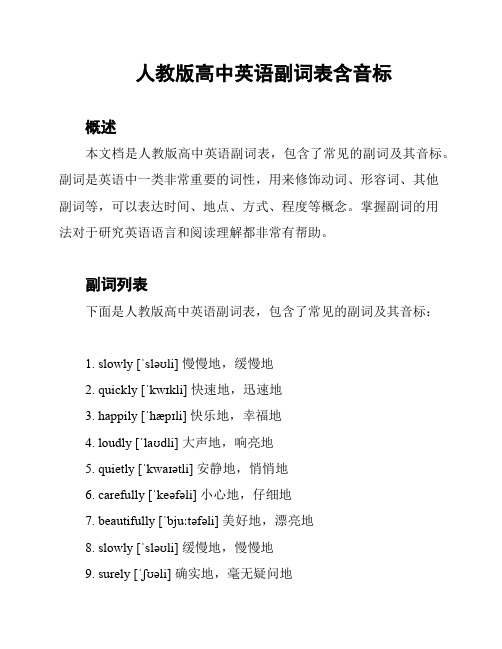
人教版高中英语副词表含音标
概述
本文档是人教版高中英语副词表,包含了常见的副词及其音标。
副词是英语中一类非常重要的词性,用来修饰动词、形容词、其他
副词等,可以表达时间、地点、方式、程度等概念。
掌握副词的用
法对于研究英语语言和阅读理解都非常有帮助。
副词列表
下面是人教版高中英语副词表,包含了常见的副词及其音标:
1. slowly [ˈsləʊli] 慢慢地,缓慢地
2. quickly [ˈkwɪkli] 快速地,迅速地
3. happily [ˈhæpɪli] 快乐地,幸福地
4. loudly [ˈlaʊdli] 大声地,响亮地
5. quietly [ˈkwaɪətli] 安静地,悄悄地
6. carefully [ˈkeəfəli] 小心地,仔细地
7. beautifully [ˈbjuːtəfəli] 美好地,漂亮地
8. slowly [ˈsləʊli] 缓慢地,慢慢地
9. surely [ˈʃʊəli] 确实地,毫无疑问地
10. suddenly [ˈsʌdənli] 突然地,忽然地
......(列表内容根据具体英语副词表进行补充)
使用方法
可以使用这份副词表作为参考,在研究、写作和阅读中灵活运用这些副词。
记住副词的音标有助于正确发音。
结语
本文档为人教版高中英语副词表含音标,希望能对学习者在英语学习中有所帮助。
灵活运用这些副词,可以提高语言表达和理解能力。
主谓宾 定状补(详解版含:汉英两种)
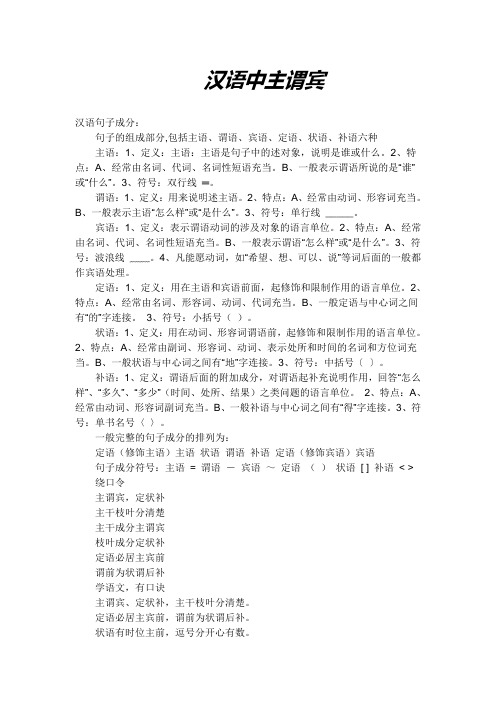
汉语中主谓宾汉语句子成分:句子的组成部分,包括主语、谓语、宾语、定语、状语、补语六种主语:1、定义:主语:主语是句子中的述对象,说明是谁或什么。
2、特点:A、经常由名词、代词、名词性短语充当。
B、一般表示谓语所说的是“谁”或“什么”。
3、符号:双行线═。
谓语:1、定义:用来说明述主语。
2、特点:A、经常由动词、形容词充当。
B、一般表示主语“怎么样”或“是什么”。
3、符号:单行线_____。
宾语:1、定义:表示谓语动词的涉及对象的语言单位。
2、特点:A、经常由名词、代词、名词性短语充当。
B、一般表示谓语“怎么样”或“是什么”。
3、符号:波浪线﹏﹏。
4、凡能愿动词,如“希望、想、可以、说”等词后面的一般都作宾语处理。
定语:1、定义:用在主语和宾语前面,起修饰和限制作用的语言单位。
2、特点:A、经常由名词、形容词、动词、代词充当。
B、一般定语与中心词之间有“的”字连接。
3、符号:小括号()。
状语:1、定义:用在动词、形容词谓语前,起修饰和限制作用的语言单位。
2、特点:A、经常由副词、形容词、动词、表示处所和时间的名词和方位词充当。
B、一般状语与中心词之间有“地”字连接。
3、符号:中括号〔〕。
补语:1、定义:谓语后面的附加成分,对谓语起补充说明作用,回答“怎么样”、“多久”、“多少”(时间、处所、结果)之类问题的语言单位。
2、特点:A、经常由动词、形容词副词充当。
B、一般补语与中心词之间有“得”字连接。
3、符号:单书名号〈〉。
一般完整的句子成分的排列为:定语(修饰主语)主语状语谓语补语定语(修饰宾语)宾语句子成分符号:主语= 谓语-宾语~定语()状语[ ] 补语< > 绕口令主谓宾,定状补主干枝叶分清楚主干成分主谓宾枝叶成分定状补定语必居主宾前谓前为状谓后补学语文,有口诀主谓宾、定状补,主干枝叶分清楚。
定语必居主宾前,谓前为状谓后补。
状语有时位主前,逗号分开心有数。
基本成分主谓宾,连带成分定状补。
高中英语常用词汇表 动词 名词 形容词和副词
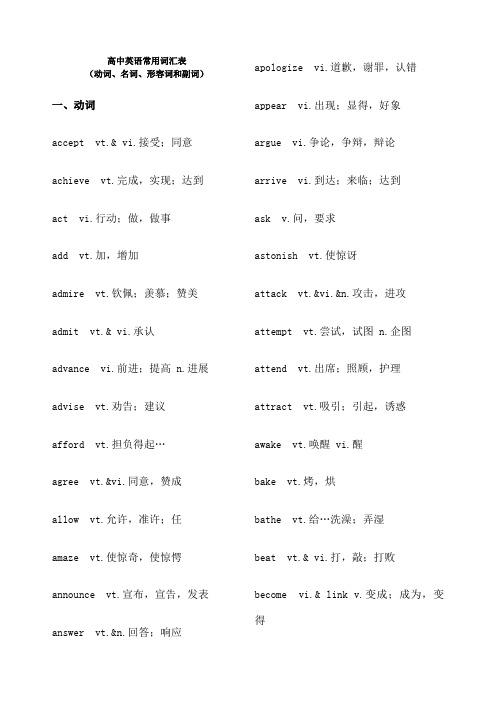
高中英语常用词汇表(动词、名词、形容词和副词)一、动词accept vt.& vi.接受;同意achieve vt.完成,实现;达到act vi.行动;做,做事add vt.加,增加admire vt.钦佩;羡慕;赞美admit vt.& vi.承认advance vi.前进;提高 n.进展advise vt.劝告;建议afford vt.担负得起…agree vt.&vi.同意,赞成allow vt.允许,准许;任amaze vt.使惊奇,使惊愕announce vt.宣布,宣告,发表answer vt.&n.回答;响应apologize vi.道歉,谢罪,认错appear vi.出现;显得,好象argue vi.争论,争辩,辩论arrive vi.到达;来临;达到ask v.问,要求astonish vt.使惊讶attack vt.&vi.&n.攻击,进攻attempt vt.尝试,试图 n.企图attend vt.出席;照顾,护理attract vt.吸引;引起,诱惑awake vt.唤醒 vi.醒bake vt.烤,烘bathe vt.给…洗澡;弄湿beat vt.& vi.打,敲;打败become vi.& link v.变成;成为,变得beg vt.&vi.请求,乞求begin vi.开始 vt.开始believe vt.相信;认为belong vi.属于,附属bend vt.使弯曲 vi.弯曲bite vt.咬,叮,螫;剌穿blame vt.责备,把…归咎于blow vt.&vi.吹 n.重击boil vi.沸腾;汽化 vt.煮沸borrow vt.借break v.断裂;打破 n. (课间)休息时间breathe vi.&vt.呼吸bring vt.带来;引出;促使build vt.建筑;建立;创立burn vi.&vt.燃烧burst v.&n.突然破裂;爆发bury vt.埋葬,葬;埋藏buy vt.买call vt.把…叫做;叫,喊care v.&n.在乎,在意照料;保护;小心carry vt.携带;运载;传送;传播catch vt.& vi.抓住;钩住;挂住;绊住celebrate vt.庆祝;歌颂,赞美charge vt.使承担;收费;充电 n.主管chat v.& n.聊天cheer vt.使振作;欢呼choose vt.&vi.选择circle vt.环绕,盘旋 n.圆climb v.爬;攀登close v.关 a.靠近的;紧密的collect vt.收集 vi.收款come vi.来,来到;出现compare vt.比较,对照;比作complete v.完成 a.完全的,彻底的conduct v.&n.举止,行为;指导congratulate vt.祝贺,向…道喜connect vt.连接,连结;联系consider vt.考虑;把...看作construct vt.建造;建设;构筑contain vt.包含,容纳continue vt.继续,连续;延伸control vt.&n.控制;支配cook vi.烹调,煮 n.厨师copy vt.抄写 n.副本cost vi.值(多少钱) ;付出代价n.成本;费用;价格;代价cough vi.咳,咳嗽 n.咳嗽count vt.数;计数cover vt.覆盖;包括;完成;走过;报道n.盖子;封面cry vi.哭;叫喊cure vt.医治;消除 n.治愈cut vt.切;割;砍damage vt.损害,毁坏 n.损害dance vi.跳舞;摇晃 n.舞deal vi.做买卖;对付decide vi.&vt.下决心;决定declare vt.断言;声明;表明defeat v.&n.击败;失败defend vt.保卫,防守delay vt.&n.推迟;耽搁;延误deliver vt.投递,送交demand vt.&n.要求;需要depend vi.依靠describe vt.形容;描写,描绘design vt.设计 n.设计;图样desire vt.欲望;要求 n.愿望destroy vt.破坏;消灭;打破determine vt.决定;查明;决心develop vt.发展;形成;冲洗(胶卷)devote vt.将…奉献,致力于die vi.死dig vt.掘,挖;采掘direct vt.指导 a.直接的disappoint vt.使失望,使受挫折discover vt.发现;暴露,显示discuss vt.讨论,谈论;论述disturb vt.打扰,扰乱;弄乱dive vi.跳水;潜水;俯冲divide vt.分;分配;分开do v.做draw v t.&vi.拉;牵;引出dream vt.&vi.做梦 n.梦想dress v.穿着n.衣服;连衣裙drink vt.饮 vi.喝 n.饮料drive vt.&vi.驱赶;驾驶drop vt.使落下;降低earn vt.赚得,挣得;获得eat vt.吃,喝 vi.吃饭educate vt.教育;培养employ vi.雇用;用;使忙于encourage vt.鼓励,支持,助长enjoy vt.享受;欣赏,喜爱enter vt.走进,进入;参加envy v.&n.羡慕;忌妒escape vt.避免 n.&vi.逃跑examine vt.检查;诊察excite vt.使兴奋;使激动excuse v.原谅n.藉口;托辞exist vi.存在;生存expect vt.料想,认为explain vt.&vi.解释,说明explode vt.使爆炸 vi.爆炸exploit vt.剥削;利用;开拓express vt.表示;表达 n.快车,快递,快讯fail vi.失败fall vi.掉下fasten vt.&vi.扎牢;扣住feed vt.喂(养) vi.吃饲料feel vi.有知觉 vt.触,摸fetch vt.拿来;请来,接去fight vi.&vt.打仗(架)fill vt.装满,盛满;占满find v.找到;发现finish vt.完成,结束 n.结束fit vt.&vi.&n.适合,合身 a.健康的fix vt.使固定;决定flash vi.一闪,闪亮float vi.漂浮 vt.使漂浮flow vi.流,流动fly v.飞跑,逃跑;飞行 n.苍蝇fold vt.折叠;合拢 n.褶follow vt.跟随;(时间等)接着fool vi.&vt.愚弄,欺骗forbid vt.禁止;不许force vt.强迫,迫使forget vt.忘记,遗忘forgive vt.原谅,饶恕,宽恕form vt.(使)组成,建立 n.形式found vt.创立,创办;建立freeze vi.冻;结冻vt.使结冰frighten vt.吓唬fry vt.油煎,油炸,油炒gain vt.&vi.获得 n.利益gather vt.集中get v.获;取give vt.做,作;送给glance vi.看一下 n.一瞥go v.去greet vt.问候grow vi.生长;变得;增长guess v.猜hang vt.挂,悬;吊死happen vi.(偶然)发生hate vt.恨,憎恨;不喜欢have v.有hear v.听见,听help v.帮助,帮忙hide v.躲藏hire vt.租借 n.租用,雇用hit vt.打;击中;撞hold vt.抓住;抑制hurry vi.赶紧 vt.催促hurt vt.使受伤;使痛心imagine vt.想象;设想improve vt.使更好 vi.改善include vt.包括,包含increase vt.&vi.&n.增加infer vt.推论,推断;猜想inform vt.通知,向…报告insist vi.坚持;坚持要求interest vt.使发生兴趣 n.兴趣interrupt vt.打断(讲话);打扰introduce vt.介绍;引进invent vt.发明,创造invite vt.邀请,聘请;招待join vt.加入jump vi.跳;暴涨 vt.跳过keep vi.保持;坚持kick vi.&vt.&n.踢kill vt.杀死kiss n.&vt.吻 vi.接吻knock vi.敲;击,打know vt.知道;认识;通晓laugh vi.笑,发笑 n.笑lay vt.放,搁;下(蛋)lead vt.领导learn vi.&vt.学,学习;了解leave vt.离开;剩下 vi.离去lend vt.把…借给let v.让liberate vt.解放lie v.躺;说谎lift vt.&vi.举起,抬起 n.电梯like v.喜欢 prep.象;跟…一样line vt.沿…排列 vi.排队 n.线,行listen vi.听,留神听;听从live vi.居住;活 a.活的;现场的load vt.装,装载look v.看lose vt.失去;迷失;输掉love vt.爱,喜欢 n.爱make v.造,制作,使…manage vt.设法;对付;管理march v.&n.行军marry vt.娶,嫁 vi.结婚mean vt.意思是…measure vt.量,测量 n.分量;步骤meet v.会;集会;满足mend vt.改正,修正;修补mention vt.&n.提到,说起miss v.错过;想念;丢失 n.小姐mix vt.&vi.混合;搅和mount vt.登上,爬上 n.山mourn vi.&vt.哀痛;哀悼move v.移动;感动murder vt.&n.谋杀notice vt.注意 n.通知;注意obey vt.顺从 vi.服从occur vi.发生;出现,存在offer vt.提供;提出 n.提供open vt.开 a.开的;开放的operate vi.&vt.动手术;操作order v.&n.定货;定货单;命令;顺序organize vt.组织,编组owe vt.欠(债等);感激own vt.所有;拥有pack vt.捆扎;挤满 n.包paint vt.漆,画 n.油漆pass v.传递;经过pause vi.&n.中止;暂停pay vt.给…报酬 n.工资perform vt.履行;表演 vi.行动permit vt.允许 n.执照persuade vt.劝说;说服pick v.摘please vt.使高兴 int.请 vi.满意pollute vt.弄脏,污染,沾污post vt.投寄,邮寄 n. 邮寄;海报pour vt.灌,倒 vi.倾泻practise vt.练习praise vt.&n.赞扬,表扬prefer vt.宁可,宁愿prepare vt.&vi.准备;预备press v.印,压 n.印刷所pretend vt.假托,借口vi.假装prevent vt.预防,防止;阻止print vt.&n.印刷produce vt.生产;产生pronounce vt.发…的音protect vt.保护prove vt.证明,证实 vi.&link v.证明是…provide vt.提供;装备,供给pull v.拉punish vt.&vi.惩罚;处罚push vt.&vi.推put vt.放,摆;使处于quarrel vi.&n.争吵raise v.举起,提高,提升,增加;饲养,养育;引起,惹起reach v.抵达,达到;(out)伸手,够到,触到 n.能达到的范围read v.朗读,阅读;看懂,理解;指明,标明;写着realise / realize v.认识到,体会到;实现receive v.收到,接到;遭受,受到;接待,接见recognize / recognise v.认出,识别;承认recommend v.推荐,介绍;劝告,建议recover v.收回;恢复,痊愈reduce v.减少,降低refer v.参考,查阅;提到refuse v.拒绝 n.拒绝;垃圾regard v.认为regret v.&n.后悔remain v.保持;剩下remember v.记得remind v.使想起remove v.移动,搬动repeat v.& n.重复reply v.&n.答复report v.& n.报告request v.&n.要求require v.要求research v.&n.研究respect v.& n.尊重return v.归还;回来review v.复习ride v.&n.开车;骑车rise v.& n.上升roll v.& n.滚动ruin v.& n.毁坏;废墟rule v.& n.统治;规则run v.跑;运转;经营;褪色;变得rush v.& n. 冲sail vi.航行satisfy vt.使满意;使满足save vt.救,挽救say v.说,讲;写着scold vt.斥责,责备scream vi.尖叫;呼啸search vt.在…中搜寻,搜查seat vt.使坐下;使就座;容纳 n.座位see v.看,看见;了解seek vt.寻找,探索;试图seem vi.好像,似乎seize vt.捉,抓;掠夺sell vt.&vi.卖send vt.送;派遣;发射separate v.分开 a.分离的;个别的serve vt.开(饭),上(菜);服务,服役set vt.镶,嵌;安装 n.(一)套settle vt.安排;定居;解决sew vi&vt缝纫,缝制,缝补shake vt.摇,使震动 n.摇动share vt.分享 n.一份shave vt.剃,刮 vi.修面shine v.照耀;发光shock vi.震动 n.冲击;震惊shoot vt.发射;射中 n.发芽shout vi.&vt.&n.喊;高呼show vt.给…看;表明shut vt.&vi.关闭sing v.唱,演唱sink v.下沉sit v.坐skate v.滑冰sleep v.&n.睡,睡眠smile v.&n.微笑spare vt.节约 a.多余的speak v.说话spell vt.拼写 vi.拼字spend vt.用钱,花费;度过spread vt.伸开;传播 n.传播stand vi.站;坐落 n.架,台stare vi.&vt.盯,凝视start vt.开始 vi.出发starve vi.饿死 vt.使饿死stay vi.停留;暂住steal vt.偷,窃取stick vt.&vi.伸,伸出 n.棍子stop vt.塞住;阻止;停止store n.商店 vt. 储存strike vt.&vi.打;击;罢工study v.学习;研究 n.研究;书房succeed vi.成功 vt.继…之后suffer vi.受苦 vt.遭受suggest vt.建议;暗示suit v.合适 n.一套(衣服) supply vt.&n.供给,供应support vt.支撑;支持;维持suppose vt.假定;猜想sweep vi.掠过;袭来;打扫swim vi.游,游泳;眼花take v.拿;取talk v.说话,谈话tap vt.&vi.&n.轻叩tax vt.抽税 n.税teach vt.教育;教书tear vt.扯开,撕裂 n.眼泪tell v.告诉;讲述thank v.谢谢think vt.想;想要;认为throw vt.&vi.投掷;摔倒tie vt.(用绳等)系,栓tire vi.疲劳,累;厌倦touch vt.触摸;接触 n.拖拉机;牵引车translate vt.翻译,译 vt.翻译travel vi.&n.旅行treat vt.治疗trust vt.&n.信任try vt.审问,审判;尽力;尝试turn v.翻;转understand vt.懂;获悉 vi.懂得unite vi.联合 vt.使联合use vt.用;耗费 n.用visit vt.参观;拜访wait vi.等,等候 n.等待wake v.醒walk vi.&n.走,步行want vt.要,想要;需要warn vt.警告,告诫wash vt.洗;冲出 vi.洗涤wear vt.穿,戴weigh vt.称…的重量;掂量whisper vt.低声地讲,私下说win vi.获胜 vt.赢得wipe vt.揩,擦wish vt.&n.希望;祝愿work v.&n.工作worry vt.(使)担忧write vt.书写;写 vi.写二、名词accident n.意外;事故ache n.疼痛,酸痛 v.痛actor n.男演员;演剧的人actress n.女演员address n.地址;演说;谈吐advantage n.优点,优势;好处adventure n.冒险,冒险活动advice n.劝告;忠告;意见affair n.事件;事情Africa n.非洲African n.非洲人 a.非洲的afternoon n下午,午后age n.年龄;时代 vt.变老agriculture n.农业,农艺;农学aim n.瞄准;目标;目的air n.空气;空中aircraft n.飞机,飞行器airport n.机场,航空站America n.美洲;美国American n.美国人 a.美洲的anger n.发怒animal n.动物,兽 a.动物的apple n.苹果April n.四月area n.地区arm n.手臂,胳膊 v.武装army n.军队arrival n.到达;来临;达到art n.艺术;美术article n.文章,论文;冠词artist n.美术家;艺术家ash n.灰,灰烬,灰堆Asia n.亚洲Asian n.亚洲人 a.亚洲的assistant n.助手,助理;助教attention n.注意,留心;注意力August n.八月aunt n.伯母,婶母,姑母,姨母,舅母Australia n.澳大利亚Australian n.澳大利亚人 a.澳大利亚的author n.创造者,作者autumn n.秋,秋季average n.平均数 a.平均的baby n.婴儿background n.背景,后景,经历bag n.提包,口袋,书包baggage n.行李bake v. 烘;烤ball n.球balloon n.气球 v.像气球banana n.香蕉bank n.银行;库;堤bargain n.交易 vi.议价;成交base n.基础;基地,根据地basin n.水盆,面盆basket n.篮,篓,筐basketball n.篮球;篮球运动bath n.浴,洗澡;浴缸bathroom n.浴室;盥洗室battle n.战役 vi.战斗 vt.与…作战beach n.海滩,湖滩,河滩bear n.熊 v. 孕育;承受,忍受beard n.胡须,络腮胡子beat v. 敲击;(连续)打击;击败beauty n.美;美人bed n.床bedroom n.卧室bee n.蜜蜂beef n.牛肉beer n.啤酒beginning n.开始,开端;起源bell n.铃,钟belt n.带,腰带,皮带;区bench n.长凳bicycle / bike n.脚踏车,自行车bill n.账单;招贴;票据biology n.生物学;生态学bird n.鸟,禽birth n.分娩;诞生;出身birthday n.生日biscuit n.(英)饼干;(美)软饼bit n.一点,一些blackboard n.黑板blanket n.毛毯,毯子,羊毛毯block n.阻塞;障碍物;街区blood n.血blouse n.短上衣board n.木板;板boat n.小船,艇body n.身体;主体;尸体bone n.骨,骨骼book n.书,书籍 vt.预定boss n.老板,上司 vt.指挥bottle n.瓶,酒瓶;一瓶bottom n.底,底部,根基bowl n.碗box n.盒子boy n.男孩,少年brain n.脑(子);脑力,智能branch n.枝条;支流;岔路;支部bread n.面包breakfast n.早饭,早餐breath n.呼吸;气息brick n.砖,砖块;砖状物bridge n.桥,桥梁;桥牌Britain n.英国,不列颠broom n.扫帚brother n.兄,弟brush n.刷子,毛刷;画笔bucket n.水桶;吊桶;铲斗building n.建筑物,大楼;建筑bus n.公共汽车bush n.灌木,灌木丛,矮树business n.商业,生意;事务butcher n.屠夫;屠杀者butter n.黄油;奶油button n.扣子;按钮 vt.扣紧cabbage n.洋白菜,卷心菜café n.咖啡馆;小餐厅cage n.畜养禽,兽的笼子cake n.蛋糕,饼,糕camera n.照相机camp n.野营,营地,兵营Canada n.加拿大Canadian n.&a.加拿大人(的)candle n.蜡烛cap n.帽子capital n.资本,资金;首都captain n.陆军上尉;队长;船长car n.汽车,小汽车card n.卡片;名片carpet n.毛毯;地毯carrot n.胡罗卜cart n.二轮运货马车case n.情况;事实;病例castle n.城堡;巨大建筑物cat n.猫,猫科,猫皮cattle n.牛cause n.原因,理由;事业 v.使;造成cave n.山洞,洞穴,窑洞ceiling n.天花板;顶逢cell n.细胞;小房间cent n.分centre n.中心;中枢 vt.集中century n.世纪;百年chain n.链,链条chair n.椅子chairman n.主席;议长,会长chalk n.粉笔chance n.机会change n.零钱;找头 vt.兑换;改变check n.支票 v.核对;检查cheek n.面颊,脸蛋cheese n.乳酪,干酪chemist n.化学家;药剂师chemistry n.化学cheque n.支票chest n.胸部chicken n.鸡肉;小鸡chief n.首长,头子child n.小孩chimney n.烟囱,烟筒;玻璃罩China n.中国Chinese a.中国的 n.中国人chocolate n.巧克力;巧克力糖choice n.选择Christmas n.圣诞节church n.教堂cigar n.雪茄烟,叶卷烟cigarette n.香烟,纸烟cinema n.电影院;电影,影片;电影艺术citizen n.公民;市民,居民city n.城市,都市clap n.拍手喝采声;霹雳声class n.(学校里的)班,课;等级;阶级classmate n.同班同学classroom n.教室clerk n.办事员;秘书clinic n.诊所,医务室;会诊clock n.钟,仪表cloth n.布;布料clothes n.衣服,服装;被褥(复数)clothing n.衣服,被褥(总称)cloud n.云club n.俱乐部;社团coal n.煤,煤块coast n.海岸,海滨(地区)coat n.外套,上衣;表皮cock n.公鸡coffee n.咖啡coin n.硬币;铸造(硬币)collar n.衣领,项圈collection n.搜集,收集;收藏品college n.(综合大学中的)学院color n.颜色,彩色;颜料comb n.梳子comfort n.舒适;安慰 vt.安慰communism n.共产主义companion n.同伴;同事company n.公司composition n.组成,构成,结构;作文computer n.计算机,电脑comrade n.同志,亲密的同伴condition n.条件;状况conductor n.售票员;(乐队)指挥congratulation n.祝贺,庆贺construction n.建造;建筑;建筑物content n.内容,目录;容量 a.满足的continent n.大陆;洲convenience n.便利,方便conversation n.会话,非正式会谈corn n.谷物;玉米corner n.角;(街道)拐角cottage n.村舍,小屋cotton n.棉;棉线;棉布counter n.柜台country n.国家,国土;农村countryside n.乡下,农村couple n.一对;夫妇courage n.勇气,胆量,胆识course n.课程;过程;一道菜court n.法院,法庭;庭院cousin n.堂(或表)兄弟(姐妹)cow n.母牛,奶牛cream n.奶油,乳脂;奶油色crop n.庄稼;收成cross n.十字架 vt.&vi.穿过 a.发怒的crowd n.群;大众;一伙人cup n.杯 vt.使成杯形cupboard n.碗柜,碗碟橱;食橱curtain n.(窗、门)帘;幕cushion n.软垫子custom n.习惯,风俗;海关customer n.顾客,主顾dad n.父亲daily a.每日的,日常的 n.日报danger n.危险date n.日期daughter n.女儿dawn n.黎明;开端 vi.破晓day n.(一)天,白昼,白天death n.死,死亡;灭亡December n.十二月decision n.决定,决心;果断deed n.行为;事迹defence / defense n.防卫;防御;辩护degree n.程度;度;学位delight n.&v.快乐department n.部,司,局,处,系depth n.深度;深厚;深处description n.描写,形容desert n.沙漠 vt.遗弃desk n.书桌,办公桌dialog n.对话,对白diamond n.金钢石,钻石;菱形diary n.日记,日记簿dictation n.口授笔录,听写dictionary n.词典,字典difference n.差别;差;分歧difficulty n.困难;难事;困境dinner n.正餐(午饭或晚饭) direction n.方向,方位;指导director n.指导者;理事;导演dirt n.尘,土;污物,污垢discovery n.发现;暴露,显示discussion n.讨论,谈论;论述disease n.疾病dish n.盘,碟;一道菜distance n.距离;远处district n.区,行政区;地区doctor n.医生,医师;博士dog n.狗dollar n.元;美元door n.门doubt n.& vt.怀疑;疑虑dozen n.一打,十二个drawer n.抽屉drawing n.图画,素描;绘图drill n.&vi.&vt.(军事)操练;钻drug n.药,药物,药材duck n.鸭,鸭肉dust n.灰尘duty n.义务;责任ear n.耳朵earth n.地球east n.东,东方 a.东方的edge n.边缘;边education n.教育;训导;教育学effect n.结果;影响;效果effort n.努力;努力的成果egg n.蛋electricity n.电,电学;电流elephant n.象end n.&v.结束;结尾enemy n.敌人;仇敌;敌兵energy n.活力;精力;能engineer n.工程师,技师England n.英格兰;(泛指)英国English n.英语 a.英国的Englishman n.英国男子entrance n.入口;进入;入场envelope n.信封equipment n.装备;设备Europe n.欧洲European n.欧洲人 a.欧洲的eve 前夜,前夕,前一刻evening n.傍晚,晚上event n.事件,大事;事变exam / examination n.考试;检查,细查example n.例子;榜样exercise n.练习;锻炼exhibition n.展览experience n.经验,感受;经历experiment n.实验;试验explanation n.解释,说明;辩解expression n.词句;表达;表情eye n.眼睛;眼力;鉴赏力face n.脸 vt.面对,面临fact n.事实;实际factory n.工厂,制造厂faith n.信任,信心;信仰family n.家庭,家里人fan n.扇子;狂热爱好者farm n.农场farmer n.农民,农夫;农场主father n.父亲fault n.缺点;过失;故障favor n.好感;赞同;恩惠fear n.害怕;担心 vt.害怕feather n.羽毛;翎毛;羽状物February n.二月feeling n.感情;感觉,知觉fellow n.人,家伙;伙伴fence n.栅栏fever n.发热,发烧;狂热field n.地,田地figure n.数字;外形;人物film n.电影;胶卷finger n.手指fire n.火;火灾 vi.开火,解雇firm n.商行,商号,公司 a.坚决的,坚定的fish n.鱼肉;鱼fist n.拳(头)flag n.旗flight n.航班;飞行;逃跑flood n.洪水 vt.淹没floor n.地板;楼层flour n.面粉,粉;粉状物质flower n.花,花卉;开花food n.食物fool n.傻瓜 vi.&vt.愚弄,欺骗foot n.英尺;足football n.足球比赛;足球forest n.森林fork n.叉;餐叉fortnight n.两星期,十四天fortune n.命运,运气;财产fountain n.泉水,喷泉;源泉fox n.狐狸freedom n.自由;自主Friday n.星期五fridge / refrigerator n.冰箱friend n.朋友friendship n.友谊,友好France n.法国French n.法国人;法语 a.法国的Frenchman n.法国人fruit n.水果fuel n.燃料 vt.给…加燃料fun n.有趣的事,玩笑fur n.(兽类的)软毛;皮毛furniture n.家具;装置,设备future n.将来,未来game n.游戏,运动,比赛garage n.汽车间(或库)garden n.花园,菜园;公园gate n.大门generation n.一代,一代人gentleman n.绅士;有教养的人geography n.地理,地理学German n.德国人;德语 a.德国的Germany n.德意志,德国gift n.礼物,赠品;天赋girl n.女孩子,姑娘glass n.玻璃;玻璃杯globe n.球;球状物;地球glove n.手套goal n.球门;得分;目的goat n.山羊god n.神,神像gold n.金a.金制的goods n.商品;货物goose n.鹅,雌鹅government n.政府;治理grade n.年级grain n.谷物,谷类;谷粒grammar n.语法;语法书granddaughter n.孙女,外孙女grandfather n.祖父;外祖父grandmother n.祖母,外祖母grandson n.孙子,外孙子grass n.草;草地Greek n.希腊人 a.希腊的greenhouse n.温室,玻璃暖房greeting n.问候,招呼,致敬ground n.地;场地;根据group n.小组,群 vi.聚集guard n.哨兵,警卫员guest n.客人guide n.向导,导游者 v.引导gun n.枪,炮,手枪habit n.习惯;习性hair n.头发haircut n.理发half n.半,一半hall n.大厅;礼堂hamburger n.汉堡包,牛肉饼hand n.手 v.传递handbook n.手册,便览,指南handful n.一把;少数,一小撮handkerchief n.手帕harvest n.收获,收成 vt.收割hat n.帽子head n.头headache n.头痛;头痛的事headmaster n.校长health n.健康,健康状况heart n.心(脏)heat n.热,炎热 vi.变热heaven n.天堂;天,天空height n.高,高度;高处hero n.男主角;英雄;勇士hill n.小山history n.历史,历史学hole n.洞;孔眼,裂开处holiday n.假日,节日;假期homework n.家庭作业honour n.荣誉 vt.给…以荣誉hope n.&vt.&vi.希望horse n.马hospital n.医院hotel n.旅馆hour n.小时;时间,时刻house n.房屋,住宅;housewife n.家庭主妇housework n.家务human n.人 a.人的,人类的humour n.幽默,诙谐hunger n.饿,饥饿;渴望husband n.丈夫ice n.冰idea n.主意,念头,思想illness n.病,疾病importance n.重要;重要性inch n.英寸income n.收入;收益;进款India n.印度Indian n.印度人 a.印度的industry n.工业,产业;勤劳information n.消息,信息;通知ink n.墨水,油墨institute n.研究所;学院instruction n.指导iron n.铁;铁制品island n.岛;岛状物jacket n.短上衣,茄克衫jam n.堵塞 vt.使…堵塞January n.一月Japan n.日本,日本国Japanese n.日本人 a.日本的jar n.坛子;罐子;缸job n.工作joke n.笑话 vi.说笑话journey n.旅行,旅程,路程joy n.欢乐;高兴judge n.法官juice n.(水果等)汁,液July n.七月jump vi.跳;暴涨 vt.跳过June n.六月key n.钥匙kilo n.公斤公里(略写)kilogram n.千克,公斤kilometer n.公里kindergarten n.幼儿园king n.国王,君主kiss n.&vt.吻 vi.接吻kitchen n.厨房,灶间kite n.风筝knee n.膝,膝盖,膝关节knife n.小刀knowledge n.知识,学识;知道lab n.实验室,研究室labour n.劳动lack n.&vi.&vt.缺乏,没有ladder n.梯子,梯状物lady n.女士;有教养的妇女lake n.湖lamp n.灯land n.陆地 v.着陆;上岸language n.语言law n.法律,法令lawyer n.律师;法学家leaf n.叶league n.联盟lecture n.&vi.演讲,讲课leg n.腿length n.长,长度;一段lesson n.功课,课;课程letter n.信;证书;字母level n.水平面 a.水平的librarian n.图书馆馆长library n.图书馆(室)life n.生命,生活lifetime n.一生,终身light n.光a.明亮的lighting n.照明,照明设备limit n.限度;限制;范围lion n.狮子;勇猛的人lip n.嘴唇list n.表;名单 v.罗列清单litre n.升living-room n.起居室loaf n.一条面包,一个面包lock n.锁 vt.锁上,锁住look v.看 n.外表lorry n.运货汽车,卡车loss n.遗失;损失;失败lot n.许多,大量;签,阄luck n.运气luggage n.行李;皮箱,皮包lunch n.午餐,(美)便餐machine n.机器;机械madam n.夫人,女士,太太magazine n.杂志,期刊mail n.邮件;邮递majority .多数;大多数man n.男人;人;人类;男子汉manager n.经理;管理人manner n.方式;态度;礼貌map n.地图March n.三月mark n.痕迹;记号 v.作记号market n.市场marriage n.结婚Marxism n.马克思主义mass n.(聚成一体的)团,块master n.主人;能手;硕士match n.比赛,竞赛;火柴material n.原料;材料mathematics / maths n.数学matter n.事情;物质May n.五月meal n.(一)餐,(一顿)饭食meaning n.意义,意思means n.方法,手段,工具meat n.肉medicine n.医学;内科学meeting n.会议,聚集,会合,会见member n.成员,会员memory n.记忆;回忆;存储menu n.菜单;饭菜,菜肴merchant n.商人message n.信息,消息;启示metal n.金属method n.方法,办法;教学法metre n.米,公尺midday n.正午,中午midnight 午夜,半夜mile 英里milk 牛奶 vt.&vi.挤奶;出奶minute 分钟minister 大臣,臣相mirror 镜子 vt.反映,反射mistake 错误 vi.误解,弄错model 模型;模式;模特儿moment 片刻;瞬间;时刻Monday n.星期一money n.货币;金钱,财富monitor n.班长;监视器monkey n.猴子,猿month n.月,月份moon n.月亮morning n.早晨,上午mother n.母亲motor n.发动机;机动车mountain n.山;山脉mouse n.鼠,耗子mouth n.嘴,口,口腔mouthful n.满口,一口,少量movement n.动作,活动;移动Mr. n.先生Mrs. n.太太,夫人museum n.博物馆music n.音乐nail n.钉子 vt.将…钉牢name n.名字;vt.说出;命名nation n.民族;国家nationality n.国籍;民族,族nature n.大自然,自然界navy n.海军neck n.颈,脖子necklace n.项链,项圈needle n.针,缝补,编织针neighbour n.邻居;邻人nephew n.侄子,外甥net n.网 vt.用网捕;用网覆盖news n.新闻,消息newspaper n.报纸niece n.侄女,甥女night n.夜,夜间noise n.喧闹声;噪声noon n.中午,正午north n.北部,北方nose n.鼻子note n.钞票,纸币;笔记noun n.名词November n.十一月number n.数目 vt.共计,达…之数nurse n.护士nut n.坚果,干果;螺母object n.物,物体;目的ocean n.海洋;洋October n.十月office n.办公室officer n.军官official n.官员 a.官方的,正式的oil n.油;石油 vt.加油于operation n.运算opinion n.意见,看法,主张orange n.橙子,桔子overcoat n.大衣ox n.牛;公牛,阉牛packet n.小包(裹),小捆page n.页,页码pain n.疼;疼痛painting n.油画;绘画;着色pair n.一对 vi.成对,配对palace n.宫,宫殿pan n.平底锅,盘子paper n.纸paragraph n.(文章的)段,节pardon n.原谅;赦免 vt.原谅Paris n.巴黎parent n.父(母)亲park n.公园part n.一部分;零件;本份party n.聚会passage n.通过;通路,通道passenger n.乘客;旅客passer-by n.过路人path n.路,小道;道路pattern n.型,式样,模,模型peace n.和平pear n.梨peasant n.农民pen n.钢笔pencil n.铅笔penny n.便士people n.人民,民族;人percent n.百分比period n.时期;学时;句号person n.人;人身;本人pet n.爱畜;宠儿a.宠爱的photograph / photo n.照片,相片physics n.物理学piano n.钢琴picnic n.郊游,野餐 vi.野餐picture n.图画,照片pie n.馅饼piece n.片;块;(文艺作品的)篇,首pig n.猪pile n堆 &vt.堆积,堆起pillow n.枕头pilot n.领航员;飞行员pin n.针,饰针 v.别住pioneer n.先锋pipe n.管子,导管,输送管pity n.怜悯;遗憾 vt.同情place n.地方,地点;住所plain n.平原 a.清楚的;朴素的plan n.&vt.计划,打算plane n.平面;飞机plant n.植物;工厂 vt.栽种plate n.盘子;碟子platform 平台play n.戏剧,表演;玩耍player n.比赛者,选手playground n.操场,运动场pleasure n.愉快,快乐;乐事plenty n.充足;大量plough n.犁 vt.&vi.犁,耕pocket n.衣袋poem n.诗歌poet n.诗人point n.观点;论点;要点pole n.杆;柱police n.警察;警察当局policeman n.警察politics n.政治,政纲,政策pollution n.污染pool n.小池;水塘population n.人口pork n.猪肉port n.港,港口position n.主张,立场;形势possession n.所有;拥有;财产postcard n.明信片pot n.罐;锅;壶potato n.土豆pound n.英镑powder n.粉末;药粉power n.能力;力;权practice n.实践;练习;业务president n.总统;董事长;校长(大学)price n.价格;代价pride n.骄傲;自满;自豪prison n.监狱,监禁prisoner n.囚犯prize n.奖赏,奖金 vt.珍视problem n.问题;习题,问题production n.生产;总产量professor n.教授program n.程序 vi.编制程序progress n.前进,进展;进步promise n.诺言 vt.&vi.答应pronunciation n.发音,发音法pump n.泵 vt.用抽机抽pupil n.小学生;学生purpose n.目的;意图;效果purse n.钱包,手袋quality n.品质quantity n.数量quarter n.四分之一;一刻钟queen n.女王;王后question n.问题;疑问 v.提问,审问,怀疑race n.(速度上的)比赛;人种,种族v.全速进行,(使)比速度,竞赛radio n.收音机,无线电报,无线电话v.用无线电通讯rail n.栏杆,围栏;铁路,铁轨(复数)railroad / railway n.铁路 v.由铁路运输rain n.雨 v.下雨rainbow n.虹ray n.光线,射线reason n.理由,原因;理性,理智v.推论,推理;说服,评理record n.记录,记载;唱片 v.记录,登记;录音relation n.关系repair n.& v.维修republic n.共和国restaurant n.餐馆result n.& v.结果revolution n.革命rice n.大米;米饭ring n.& v.铃,铃声;打铃river n.河流road n.道路rock n.& v.岩石;摇动role n.角色roof n.屋顶room n.房间;空间root n.& v.树根;扎根rose n.玫瑰row n.& v.排;划(小船)rubber n.橡胶rubbish n.垃圾ruler n.尺子Russia n.俄罗斯Russian n.& a. 俄罗斯人(的),俄罗斯的safety n.安全,保险sailor n.水手,海员,水兵sale n.卖,销售salt n.盐sand n.沙,沙地sandwich n.三明治;夹心面包 vt.夹入,挤进satisfaction n.满意;快事;赔偿Saturday n.星期六scene n.(戏剧等的)一场school n.学校science n.科学scientist n.科学家score n.二十;(比赛)得分 v.积分,得分sea n.海洋,海season n.季,季节,时节secret n.秘密secretary n.秘书;书记seed n.种子seller n.卖者;行销货sense n.感官;感觉;见识sentence n.句子 vt.判决,宣判September n.九月servant n.仆人,佣人service n.服务sex n.性别,性shade n.阴暗处shadow n.影子shame n.羞耻,羞愧;羞辱shape n.形状;情况 vt.形成sheep n.羊,绵羊sheet n.被单;纸张;薄板shelf n.搁板,架子ship n.轮船 v.用船运输shirt n.(男式)衬衫shoe n.鞋shop n.商店,店铺;车间 v.购物shore n.滨,岸shot n.发射;射击声shoulder n.肩膀 vt.承担,挑起,肩负shower n.阵雨 vi.下阵雨side n.边;面sigh n.&vi.叹气,叹息sight n.视力;视觉;见sign n.征兆,迹象,记号 v.签字;打手势silence n.寂静,沉默silk n.(蚕)丝;丝织品,绸silver n.银;银子sir n.先生,阁下;…爵士sister n.姐、妹situation n.位置;处境;形势size n.尺寸,大小skill n.技能,技巧;熟练skin n.皮,皮肤skirt n.女裙sky n.天空slave n.奴隶smell n.嗅觉;气味 vt.嗅smoke n.烟;抽烟 vi.冒烟;抽烟snake n.蛇snow n.雪 vi.下雪soap n.肥皂socialism n.社会主义society n.社会;会;社团sock n.短袜soil n.土壤;土地soldier n.士兵,战士son n.儿子song n.歌曲sort n.种类;类别 vt.整理soul n.灵魂;精神;人sound n.声音,声响 a.健康的;完好的link v.听起来soup n.汤south n.南,南方 a.南方的space n.空间;场地;空白Spanish n.西班牙语speech n.言语,讲话speed n.速度spirit n.精神;气魄;情绪spoon n.匙,调羹sport n.运动spring n.春天,春季square n.正方形;平方;广场stage n.舞台;戏剧;阶段stair n.(常用复数)楼梯stamp n.戳子;邮票;标志standard n.标准 a.标准的star n.星星state n.州;国家;政府 v.陈述,阐明station n.站,车站 vt.驻扎;安置steam n.蒸汽 vi.蒸发 vt.蒸steel n.钢step n.(脚)步;步骤 vi.走stomach n.胃;肚子;食欲stone n石头storm n.风暴;暴(风)雨story n.故事,小说,传说;过程;生平stranger n.陌生人;新来者street n.街道strength n.力量;力气struggle n.&vi.斗争,奋斗student n.学生subject n.题目;学科;主语success n.成功,成就,胜利sugar n.糖suitcase n.箱子summer n.夏,夏季sun n.太阳,日Sunday n.星期日,礼拜日sunset n.日落(时分)supper n.晚餐surface n.表面surprise n.惊奇,诧异 vt.使惊讶sweat n.汗sweater n.厚运动衫,毛线衫table n.桌子tail n.尾巴;尾部tailor n.裁缝tale n.传说;故事tape n.胶带 vt.系,捆task n.任务,工作,作业taxi n.出租汽车tea n.茶;茶叶;茶树teacher n.教师team n.队 vi.协作,合作technique n.技术,技巧;技能telegram n.电报telegraph n.电报机;电报telephone n.电话 vi.打电话television n.电视;电视机temperature n.温度tense n.时态 n.紧张tent n.帐篷term n.期,学期,任期;条件;术语test n.&vt.测验,考查text n.课文;课本theatre n.戏院;戏剧;戏剧艺术thief n.窃贼,偷窃犯thing n.事情,东西thought n.思想;思维;想法thread n.线Thursday n.星期四ticket n.票;(交通违章)罚款传票tiger n.老虎time n.时间;次数tin n.锡;罐头tip n.梢,末端,尖端;小费;建议title n.标题,题目;称号tobacco n.烟草,烟叶toilet n.厕所,盥洗室,浴室tomato n.番茄,西红柿tongue n.舌头;语言;口语tool n.工具;用具tooth n.牙齿top n.顶;首位 a.顶的tour n.&vi.旅行,游历tower n.塔town n.镇,城镇toy n.玩具,玩物track n.足迹;(火车的)轨道tractor n.拖拉机;牵引车traffic n.交通,街道,车辆train n.火车 v.训练training n.训练,锻炼,培养transport n.&v.运输;运输工具treasure n.财富;珍宝 vt.珍视tree n.树trick n.诡计;计谋trip 行程trouble n.烦恼;困难 vi.烦恼trousers (pl.)n.长裤truck n.卡车truth n.真理;真相Tuesday n.星期二type n.类型;样式umbrella n.伞uncle n.叔,伯,舅,姨父uniform a.一样的 n.制服unit n.单位;单元;部件universe n.宇宙,世界university n.综合性大学vacation n.假期,休假valley n.流域;(山)谷value n.价值 vt.尊重,重视,评价variety n.多样化;种类;变种vegetable n.植物;蔬菜verb n.动词victory n.胜利village n.乡村,村庄visitor n.访问者;参观者voice n.说话声;意见;语态 v.说出volleyball n.排球,排球运动voyage n.航海;航行waiter n.侍者,服务员waitress n.女侍者,女服务员wall n.墙,壁,围墙,城墙war n.战争;冲突,斗争waste n.&vt.浪费watch n.手表 v.观看water n.水 v.浇水wave n.波,波浪;波动 v.挥手,招手way n.路;路线;方向weakness n.虚弱,软弱;弱点wealth n.财富,财产;丰富weather n.天气wedding n.婚礼Wednesday n.星期三week n.星期,周weekend n.周末,周末假期weight n.重;砝码;重担well n.井;泉水;深坑 adv.好地;十分 a.健康的west n.西部,西方wheat n.小麦wheel n.轮,车轮wife n.妻子wind n.风 v.蜿蜒window n.窗子,窗户,窗口wine n.酒wing n.翅膀winter n.冬天,冬季wire n.(金属)线;电线woman n.妇女,女人wonder n.惊异,惊奇;奇迹 v.想知道wood n.树林wool n.羊毛;毛线,绒线word n.词,单词;语言;消息worker n.工人world n.世界wound n.创伤,伤 vt.使受伤yard n.码(英美长度单位)year n.年;年年zero n.零;零点,零度zoo n.动物园三、形容词able a.有能力的;能干的active a.活跃的;积极的;主动的actual a.实际的;现行的afraid a.(表语)怕,害怕alive a.活着alone a.单独的 ad.单独地angry a.发怒的,生气的anxious a.渴望的;忧虑的asleep a.睡着的,睡熟的backward a.向后的;倒的 ad.倒bad a.坏的,恶的;严重的basic a.基本的,基础的beautiful a.美的,美丽的best a.最好的better a.较好的 ad.更好地big a.大的bitter a.痛苦的;严寒的black a.黑色的。
常用英语语法术语英汉对照表
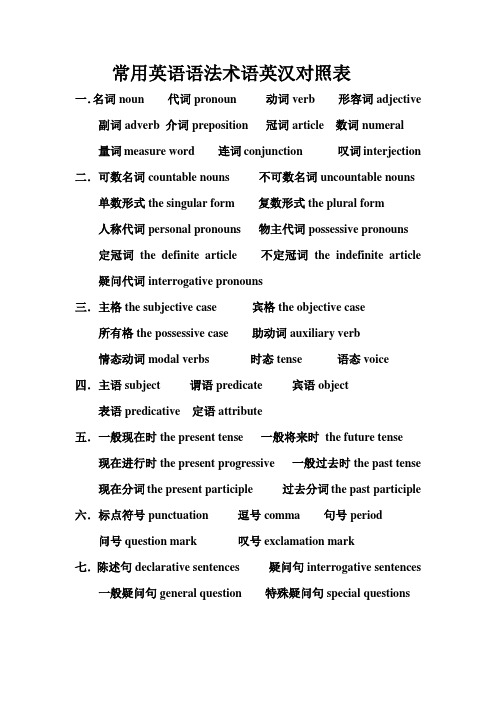
常用英语语法术语英汉对照表一.名词noun 代词pronoun 动词verb 形容词adjective 副词adverb 介词preposition 冠词article 数词numeral量词measure word 连词conjunction 叹词interjection 二.可数名词countable nouns 不可数名词uncountable nouns 单数形式the singular form 复数形式the plural form人称代词personal pronouns 物主代词possessive pronouns定冠词the definite article不定冠词the indefinite article 疑问代词interrogative pronouns三.主格the subjective case宾格the objective case 所有格the possessive case助动词auxiliary verb情态动词modal verbs时态tense语态voice 四.主语subject 谓语predicate宾语object表语predicative定语attribute五.一般现在时the present tense 一般将来时the future tense 现在进行时the present progressive 一般过去时the past tense 现在分词the present participle 过去分词the past participle 六.标点符号punctuation 逗号comma 句号period 问号question mark 叹号exclamation mark七.陈述句declarative sentences 疑问句interrogative sentences 一般疑问句general question 特殊疑问句special questions。
英语词性变化对照表

desperate
desperately
毁坏
destruction
destroy
下决心
determination
determine
determined
发展
development
develop
不同的
difference
different
differently
困难的
difficulty
difficult
permit
人
person
personality·人格
personal·个人的
personally·亲自
物理
physics
Physical
physically
政策
policy
politician·政治家
politics·政治
Political
politically
拥有
possession·财产
possess
loud
修改
alternative·选择
alter
alternative·两者择一的
惊奇
amazement
amaze
amazed·感到惊奇的
amazing·令人惊奇的
发笑
amusement·娱乐
amuse
amused·感到可笑的
amusing·令人发笑的
分析
analysis
analyse
愤怒
anger
电
electricity
electric·电动的
electrical·与电有关的
electronic·电子的
使窘迫
embarrass
仁爱版初中英语副词表(默写版)
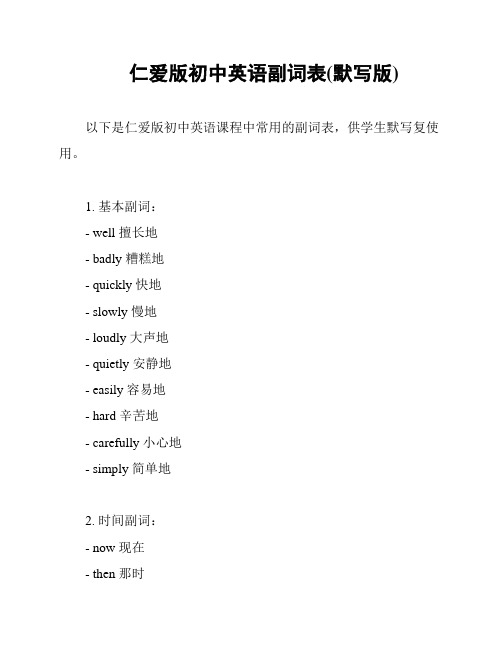
仁爱版初中英语副词表(默写版)以下是仁爱版初中英语课程中常用的副词表,供学生默写复使用。
1. 基本副词:- well 擅长地- badly 糟糕地- quickly 快地- slowly 慢地- loudly 大声地- quietly 安静地- easily 容易地- hard 辛苦地- carefully 小心地- simply 简单地2. 时间副词:- now 现在- then 那时- quickly 快速地- slowly 慢慢地- already 已经- recently 最近- suddenly 突然地- before 以前- soon 快点- still 仍然3. 方式副词:- well 好地- badly 坏地- quickly 快速地- slowly 慢慢地- loudly 大声地- quietly 安静地- easily 容易地- hard 努力地- carefully 小心地- simply 简单地4. 程度副词:- very 非常- quite 相当- so 非常- too 太- enough 足够- really 真地- almost 几乎- just 刚好- enough 足够- much 很多5. 频度副词:- always 总是- usually 通常- often 经常- sometimes 有时候- seldom 难得- never 从不- again 再一次- already 已经- just 刚刚- ever 曾经祝学习顺利!。
初中英语人教版七八九年级动词形容词副词归类
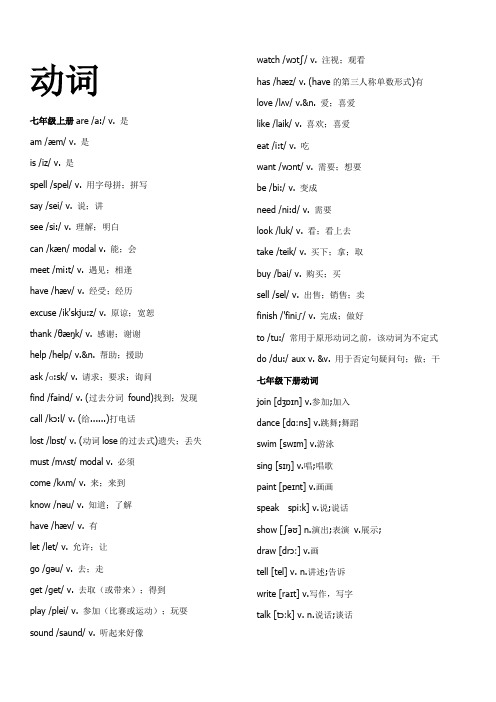
动词七年级上册are /a:/ v. 是am /æm/ v. 是is /iz/ v. 是spell /spel/ v. 用字母拼;拼写say /sei/ v. 说;讲see /si:/ v. 理解;明白can /kæn/ modal v. 能;会meet /mi:t/ v. 遇见;相逢have /hæv/ v. 经受;经历excuse /ik'skju:z/ v. 原谅;宽恕thank /θæŋk/ v. 感谢;谢谢help /help/ v.&n. 帮助;援助ask /ɑ:sk/ v. 请求;要求;询问find /faind/ v. (过去分词found)找到;发现call /kɔ:l/ v. (给......)打电话lost /lɒst/ v. (动词lose的过去式)遗失;丢失must /mʌst/ modal v. 必须come /kʌm/ v. 来;来到know /nəu/ v. 知道;了解have /hæv/ v. 有let /let/ v. 允许;让go /gəu/ v. 去;走get /get/ v. 去取(或带来);得到play /plei/ v. 参加(比赛或运动);玩耍sound /saund/ v. 听起来好像watch /wɔtʃ/ v. 注视;观看has /hæz/ v. (have的第三人称单数形式)有love /lʌv/ v.&n. 爱;喜爱like /laik/ v. 喜欢;喜爱eat /i:t/ v. 吃want /wɔnt/ v. 需要;想要be /bi:/ v. 变成need /ni:d/ v. 需要look /luk/ v. 看;看上去take /teik/ v. 买下;拿;取buy /bai/ v. 购买;买sell /sel/ v. 出售;销售;卖finish /'finiʃ/ v. 完成;做好to /tu:/ 常用于原形动词之前,该动词为不定式do /du:/ aux v. &v. 用于否定句疑问句;做;干七年级下册动词join [dʒɒɪn] v.参加;加入dance [dɑːns] v.跳舞;舞蹈swim [swɪm] v.游泳sing [sɪŋ] v.唱;唱歌paint [peɪnt] v.画画speak spiːk] v.说;说话show [ʃəʊ] n.演出;表演v.展示;draw [drɔː] v.画tell [tel] v. n.讲述;告诉write [raɪt] v.写作,写字talk [tɔːk] v. n.说话;谈话make [meɪk] v.使或为;制造teach [tiːtʃ] v.教,讲授exercise [eksəsaɪz] v.n.锻炼;练习shower [ʃaʊə] n. v.淋浴;淋浴器(间)work [wɜːk] n.& v.工作brush [brʌʃ] v.刷run [rʌn] v. 跑;奔walk [wɔːk] 行走;步行clean. [kliːn] v.打扫;弄干净;adj.干净的taste [teɪst] v.有…的味道;品尝n..味道;ride[raɪd]v.骑n.旅rode. [rəʊd]ridden.[rɪdn.] 七年级下册by [baɪ] 通过,被drive [draɪv] 开车stop [stɒp] 停止afraid [əfreɪd] 害怕;惧怕leave [liː v] 离开;left (lea ve的过去式) dream [driːm] 梦想;睡梦arrive [əraɪv] 到达listen [lɪs(ə)n]听;倾听fight [faɪt] 打架;战斗wear [weə] 穿;戴bring [brɪŋ] 带来;取来out [aʊt] 外出relax [rɪlæks] 放松;休息read [riːd] 读;阅读remember [rɪmembə] 记住; 记起follow [fɒləʊ] 遵循;跟随keep [kiːp] 保持;保留learn [lɜːn] 学习;学会forget [fəget] v.忘记;旗杆cut [kʌt] v. 砍;切kill [kɪl] v.杀死;弄死use [juːz] v.使用;运用wash [wɒʃ] v.洗race [reɪs] 竞赛miss [mɪs] v怀念.思念wish [wɪʃ] v. 希望rain [reɪn] v或n,下雨;雨水snow [snəʊ]下雪;雪Snow cook [kʊk] 做饭visit [vɪzɪt] 拜访;参观sit [sɪt] 坐pay [peɪ] 付费across [əkrɒs] 过;穿过turn [tɜːn]转向;翻spend [spend] 花(时间、钱等) climb [klaɪm]爬enjoy [ɪndʒɒɪ] 享受;喜爱put [pʊt] 放criminal [krɪmɪn(ə)l] 犯罪describe [dɪskraɪb] 描述order [ɔːdə] 点菜;命令blow [bləʊ] 吹feed [fiːd] 喂养;饲养milk [mɪlk] 挤奶grow [grəʊ] 种植;生长;发育pick [pɪk] 采;摘worry [wʌrɪ] 担心;担忧as [æz; əz] 作为,当做stay [steɪ] 停留away [əweɪ] 离开shout [ʃaʊt] 呼叫,喊叫jump [dʒʌmp] 跳跃wake [weɪk] 弄醒,醒startmove [muːv] 移动[stɑːt]开始,着手fly [flaɪ] 飞hear(heard) [hɪə] 听到;听见could[kʊd] 能;可以shop [ʃɒp] v.购物cross [krɔs] 交叉八年级上册动词seem [siːm] vi.似乎;好像try [traɪ] v.尝试;设法;努力(try to do sth. /try doing sth.)wonder ['wʌndə(r)] v.惊奇;想知道;怀疑wait [weɪt] v.等;等待(wait for)dislike [dɪs'laɪk] v.不喜欢;厌恶n.不喜爱;厌恶;反感decide [dɪ'saɪd] v.决定;选定(decide to do sth.)die [daɪ] v.死;枯竭;消失give [ɡɪv] v.给;赠予;送win [wɪn] v.赢;赢得;获胜;获得n.胜利care [keə(r)] v.关心;担忧;照顾;在乎touch [tʌtʃ] vt.触摸;感动reach [riːtʃ] v.到达;伸出;达成;取得联系;延伸;(伸手)去够break [breɪk] v.打碎;折断;违背;解决;中断laugh [lɑːf] v.发笑;笑;嘲笑n.笑声;笑;笑料which pron.哪一个;哪些share [ʃeə(r)] vt.分享,共享;分配;共有should [ʃəd] aux.应该;可能;应当;将要close [kləʊs] v.关;合拢;不开放;停业choose [tʃuːz] v.选择;决定act [ækt] v.行动;表演makeup编造stand [stænd] v.站立;忍受happen ['hæpən] vi.发生;碰巧;出现;偶遇expect [ɪk'spekt] v.预期;期待;盼望appear [ə'pɪə(r)] vi.出现;出版;显得become [bɪ'kʌm] v.变成;成为may [meɪ] aux.可以,能够;可能,也许might [maɪt] aux.可能;也许;may的过去式send [send] 邮寄,发送able [ˈebəl] 能够discuss [dɪˈskʌs] 讨论,商量promise [ˈprɑmɪs] 承诺,诺言improve [ɪmˈpruv] 改进,改善plant [plænt] 种植,植物believe [bɪ'liːv] 相信disagree [ˌdɪsə'ɡriː]不同意fall [fɔːl] 倒塌;跌倒peel[piːl] vt.剥落;削皮add[æd] 增加celebrate['selɪbreɪt] 庆祝;庆贺serve[sɜːrv] 接待,服务pour [pɔːr] pour[pɔːr] 倒;倾倒prepare [prɪ'per]v.预备;准备hang[hæŋ] 悬挂;(使)低垂catch[kætʃ] 赶上;抓住;捕捉invite [ɪn'vaɪt] 邀请accept[ək'sept] 接受;refuse [rɪ'fjuːz] 拒绝reply [rɪ'plaɪ] 回答,回复forward['fɔːrwərd] 转交;发送,向前的delete [dɪ'liːt] 删除trust[trʌst] 相信,信任advise [əd'vaɪz] v劝告,建议solve [sɑːlv] 解决;解答organize['ɔːrɡənaɪz] 组织,筹备upset[ʌp'set]难过,失望advice[əd'vaɪsɪ]劝告,建议八年级下册动词matter [ˈmætə] v. 重要,要紧,有关系lie [laɪ] v. 躺,平躺break [breɪk] n. & v. 休息,暂停;打破hurt [hə:t] v. 伤害,损害,使受伤thit [hit] v. (hit/hit)碰撞,打,打击press/pres/v.压;挤;按breathe [bri:ð] v. 呼吸mean [mi:n] v. 意味着,意思是,意欲control [kən'trəʊl] v. 控制,支配,操纵cheer [tʃiə] v. 欢呼raise [reɪz] v. 抬起,举起,筹集,征集repair [riˈpɛə] v. 修理,修补fix [fiks] v. 修理,安装imagine [ɪˈmædʒɪn] v. 想象,设想open [ˈəʊpən] v. 打开carry ['kærɪ] v. 携带,搬运train [treɪn] v. 训练,培养understand [ˌʌndəˈstænd] v. 懂,理解fold [fəʊld] v. 对折,折叠sweep/sw i:p/v.(swept/swept)扫;打扫throw [θrəʊ] v. 扔,投掷pass [pɑ:s] v. 前行,经过,批准borrow ['bɒrəʊ] v. 借,借用lend [lend] v. 借给,借出hate [heɪt] v. 憎恶,讨厌waste [weɪst] v. 浪费,消耗provide [prə'vaid] v. 提供,供给,供应depend [diˈpend] v. 取决于,依靠,依赖develop [dɪˈveləp] v. 发展,壮大,开发,研制drop [drɔp] v. 落下,跌落allow [əˈlaʊ] v. 允许,准许guess [ɡes] v. 猜测,估计deal [di:l] v. 处理,应付argue [ˈɑ:ɡju:] v. 争论,争吵offer ['a:fər] v. 提供,自愿给予communicate [kəˈmju:nikeit] v. 沟通,通信,通讯explain [ɪkˈspleɪn] v. 讲解,解释,说明copy [ˈkɔpi] v. 复制return [rɪ'tɜ:n] v. 回来,返回,归还compete [kəm'pi:t] v. 比赛,竞争continue [kənˈtɪnju:] v. 继续,连续compare [kəm'peə] v. 比较push/puʃ/v.鞭策,督促,推动begin [bɪˈgɪn] v. (began)开report [riˈpɔ:t] v. 报导,报告beat [bi:t] v.(beat) 敲打,打败rise [raɪz] v. (rose)上升,升起realize [ˈri:əlaɪz] v. 认识到,了解shoot [ʃu:t] v.(shot) 投篮,射击,发射remind [rɪˈmaɪnd] v. 提醒,使想起hide [haɪd] v. 躲藏,隐藏excite [ɪk'saɪt] v. 使激动,使兴奋fit [fɪt] v. 适合,合身marry [ˈmæri] v. 与某人结婚cheat [tʃi:t] v. 欺骗,愚弄shine [ʃaɪn] v. 照耀,发光protect [prəˈtekt] v. 保护include [ɪnˈklu:d] v. 包括,包含succeed[səkˈsi:d] v. 成功,实现目标,完成achieve [əˈtʃi:v] v. 完成,实现weigh [wei] v. 称…重量hurry ['hʌrɪ] v. 匆忙,赶快belong [biˈlɔŋ] v. 属于introduce [ˌɪntrəˈdju:s] v. 介绍,传入,引进invent [inˈvent] v. 发明,创造encourage [inˈkʌridʒ] v. 鼓励,激励collect [kəˈlekt] v. 收集ride [raɪd] n. & v. 骑,乘;(短途)旅程search [sɜ:tʃ] v. 搜索,搜查consider [kənˈsidə] v. 仔细考虑,思考,注视,hold [həuld] v. 拥有,抓住九年级全一册动词repeat v. 重复;重做note /n n. 笔记;记录v. 注意;指出pronounce v. 发音increase v. 增加;增长connect v.(使)连接;与…有联系review v. & n. 回顾;复习steal v. 偷;窃取lay v. 放置;安放;产(卵);下admire v. 欣赏;仰慕flie v. 平躺;处于punish v. 处罚;惩罚warn v. 警告;告诫spread v. 传播;展开n. 蔓延;传播suggest v. 建议;提议dare v. 敢于;胆敢require v. 需要;要求influence v. & n. 影响produce v. 生产;制造;出产process v. 加工;处理avoid v. 避免;回避paint v. 用颜料画;刷漆polish v.磨光;修改;润色complete v. 完成list v. 列表;列清单n. 名单;清单mention v. 提到;说到boil v. 煮沸;烧开translate v. 翻译lock v. 锁上;锁住divide v. 分开;分散smoke /sm@Uk/ v. 冒烟;吸烟n. 烟pierce v. 扎;刺破;穿透lift v. 举起;抬高regret v. 感到遗憾;懊悔manage v. 完成(困难事);应付(困难局面)educate v. 教育;教导enter v. 进来;进去attend v. 出席;参加valuable v adj. 很有用の;宝贵のexpress v. 表示;表达receive v. 接受;收到prevent v. 阻止;阻挠prefer v. 更喜欢suppose v. 推断;料想shut v. (shut, shut) 关闭;关上sense v. 感觉到;意识到n. 感觉;意识reflect v. 反映;映出perform v. 表演;执行bow v. 鞠躬kiss v. & n. 亲吻;接吻greet v. 和⋯⋯打招呼;迎接value v. 重视;珍视n. 价值knock v. 敲;击behave v. 表现;举止examine v(.仔细地)检查;检验kick v. 踢;踹pull v. 拉;拖nod v. 点头disappoint v. 使失望miss /mIs/ v. 错过;未得到stare /ste@/, /ster/ v. 盯着看;凝视burn /b3:(r)n/ v. (burnt /b3:(r)nt/, burned /b3:(r)nd/;burnt, burned) 着火;燃烧announce v. 宣布;宣告cost v. 花费n. 花费;价钱afford v. 承担得起(后果);买得起recycle v. 回收利用;再利用shall /S v. 将要;将会overcome v. 克服;战胜graduate v. 毕业;获得学位congratulate v. 祝贺fail v. 失败;未能(做到)recall v. 回忆起;回想起oversleep v.(overslept , overslept) 睡过头;睡得太久形容词七年级上册good /gud/ adj. 好的fine /fain/ adj. 健康的;美好的red /red/ adj.& n. 红色(的)yellow /'jeləu/ adj.& n. 黄色(的)green /gri:n/ adj.& n. 绿色(的)blue /blu:/ adj.& n. 蓝色(的)black /blæk/ adj.& n. 黑色(的)white /wait/ adj.& n. 白色(的)purple /'pə:pl/ adj.& n. 紫色(的)brown /braun/ adj.& n. 棕色(的);褐色(的)nice /nais/ adj. 令人愉快的;宜人的last /la:st/ adj. 最后的;末尾的middle /'midl/ adj. 中间的;中间next /nekst/ adj.&n. 下一个(的);接下来(的)welcome /'welkəm/ adj. 受欢迎的some /sʌm/ adj. 一些;某些tidy /'taidi/ adj. 整洁的;井井有条的late /leit/ adj. 迟到great /greit/ adj. 美妙的;伟大的interesting /'intrəstiŋ/ adj. 有趣的boring /'bɔ:riŋ/ adj. 没趣的;令人厌倦的fun /fʌn/ adj. 有趣的;使人快乐的n.乐趣;快乐difficult /'difikəlt/ adj. 困难的relaxing /ri'læksiŋ/ adj. 轻松的;令人放松的same /seim/ adj. 相同的easy /'i:zi/ adj. 容易的;不费力的right /rait/ adj. 正确的;适当的healthy /'helθi/ adj. 健康的fat /fæt/ adj. 肥的;肥胖的much /mʌtʃ/ pron.&adj. 许多;大量;多少big /big/ adj. 大的;大号的small /smɔ:l/ adj. 小的;小号的short /ʃɔ:t/ adj. 短的;矮的long /lɔ:ŋ/ adj. 长的all /ɔ:l/ adj. 所有的;全部的happy /'hæpi/ adj. 愉快的;高兴的old /əuld/ adj. 年老的;旧的dear /diə/ adj. 亲爱的busy /'bizi/ adj. 忙碌的;无暇的favorite /'feivərit/ adj.&n.特别喜爱的(人或事物)free /fri:/ adj. 空闲的cool /ku:l/ adj. 妙极的;酷的useful /'ju:sfl/ adj. 有用的;有益的七年级下册dressed [dresɪd] adj.穿着衣服early [ɜːlɪ] adv.adj.早的funny [fʌnɪ] adj.奇怪的;滑稽好笑的best[best] adj.& ad. v.(good, well的比较级)最好的(地)new [njuː] 新的live [lɪv] 活的,生动的many [menɪ]许多true[truː] 真的;符合实际的sorry [sɒrɪ]抱歉的;难过的;惋惜的outside [aʊtsaɪd] ad. v.在外面adj.外面的important [ɪmpɔːt(ə)nt] 重要的quiet [kwaɪət] 安静的dirty [dɜːtɪ] 脏的more [mɔː] 更多的noisy [nɒɪzɪ] 吵闹的terrible[terɪb(ə)l] 非常讨厌的;可怕的feel [fiːl] 感受;觉的strict [strɪkt] 严格的;严厉的cute [kjuːt] adj可爱的;机灵的lazy [leɪzɪ] 懒散的;懒惰的smart [smɑːt] adj 聪明的beautiful [bjuːtɪfʊl] adj 美丽的;美好的scary [skeərɪ] adj吓人的;恐怖的friendly [fren(d)lɪ] adj 友好的shy [ʃaɪ] adj 羞怯的;腼腆的young [jʌŋ] 幼小的,年轻的any [enɪ] 任何一个.任一的other [ʌðə] adj另外的delicious [dɪlɪʃəs] adj 可口的.美味的windy [wɪndɪ] 多风的cloudy [klaʊdɪ] 多云的sunny [sʌnɪ] 晴朗的bad [bæd] 坏的;糟的dry [draɪ]干燥的cold [kəʊld] 寒冷的;冷的hot [hɒt] 热的warm [wɔːm] 温暖的hard [hɑːd]努力地;困难的snowy [snəʊɪ] 下雪的Russian [rʌʃ(ə)n]俄罗斯的;俄罗斯人;俄语rainy [reɪnɪ] 阴雨的;多雨的American adj美国的;美洲的n.美国人;美洲人north [nɔːθ] 北;北方;北方的free [friː]免费的curly [kɜːlɪ]卷曲的straight [streɪt] 直的tall [tɔːl] 高的medium [miːdɪəm] 中等的thin [θɪn] 瘦的heavy [hevɪ] 重的little [lɪt(ə)l] 小的handsome [hæns(ə)m] 英俊的blonde [blɒnd] adj. 金黄色的round [raʊnd]圆形的real [riːl] 真正的large[lɑːdʒ]大号的;大的different [dɪf(ə)r(ə)nt]不同的lucky幸运的popular受欢迎的;普遍的lovely [lʌvlɪ] 可爱的cheap[tʃiːp] 廉价的;便宜的slow [sləʊ] 缓慢的;迟缓的fast [fɑːst] 快地(的)interested [ɪnt(ə)rɪstɪd] 感兴趣的dark [dɑːk] 黑暗的;昏暗的natural[nætʃ(ə)r(ə)l] adj. 自然的tired [taɪəd] 疲倦的baby [beɪbɪ] 幼小的high [haɪ] 高的(地)scared [skeəd] 惊慌的specia l [speʃ(ə)l] 特色菜;特价品;特别的;特殊的excellent [eks(ə)l(ə)nt]极好的;优秀的exciting [ɪksaɪtɪŋ; ek-]使人兴奋的;令人激动的expensive [ɪkspensɪv; ek-] 昂贵的八年级上册wonderful ['wʌndəfl] adj.精彩的;极好的few [fjuː] adj.很少的;n.少量most [məʊst] adj.最多的;大多数的;bored [bɔːd] adj.无聊的;厌烦的;郁闷的enough [ɪ'nʌf] adj.足够的adv.足够地;充分地hungry(反full) ['hʌŋɡri] adj.饥饿的;渴望的wet [wet] adj.湿的;雨天的full [fʊl] adj.满的;充满的;完全的least [liːst] adj.最小的;最少的percent [pə'sent] adj.百分之...的online [ˌɒn'laɪn] adj.在线的adv.在线地such [sʌtʃ] adj.这样的;如此的less [les] adj.更少的;较少的outgoing ['aʊtɡəʊɪŋ] adj.外向的better ['betə(r)] adj.更好的;较好的adv.更好地hard-working [hɑːd'wɜːkɪŋ] adj.勤勉的;努力工作的which adj.哪一个;哪一些talented ['tæləntɪd] adj.有才能的;有天赋的serious ['sɪəriəs] adj.严肃的;严重的;庄重的necessary ['nesəsəri] adj.必要的;必然的similar ['sɪmələ(r)] adj.类似的loud [laʊd] adj.大声的;adv.大声地;响亮地primary ['praɪməri] adj.最初的,最早的comfortable ['kʌmftəbl] adj.舒适的;充裕的worst [wɜːst] adj.最坏的;最差的fresh [freʃ] adj.新鲜的;清新的worse [wɜːs] adj.更坏的;更差的creative [kri'eɪtɪv] adj.创造的,创造性的;common ['kɒmən] adj.常见的;共同的;普通的poor [pɔː(r)] adj.可怜的;贫穷的crowded ['kraʊdɪd] adj.拥挤的meaningless ['miːnɪŋləs] adj.无意义的;不重要的famous ['feɪməs] adj.著名的;有名的rich [rɪtʃ] adj.富有的;富饶的;丰富的successful [sək'sesfl] adj.成功的;圆满的main [meɪn] adj.主要的;最重要的unlucky [ʌn'lʌki] adj.倒霉的不幸的不吉利的lose [luːz] vt.丢失;失败vi.失败ready ['redi] adj.准备好的;乐意的simple ['sɪmpl] adj.简单的朴素的单纯的笨的fantastic [fæn'tæstɪk] adj.极好的;了不起的both [bəʊθ] adj.两者都pron.两者educational [ˌedʒu'keɪʃənl] adj.教育的;有教育意义的foreign ['fɔːrən] 外国的physical ['fɪzɪkl]身体的own [oʊn] 自己的,本人的,拥有personal ['pɜːrsənl]个人的,私人的dangerous ['deɪndʒərəs] 危险的possible ['pɑːsəbl] 可能的traditional [trə'dɪʃənl] 传统的available[ə'veɪləbl] 可得到的;有空的;normal['nɔːrml]正常的worried ['wɜːrid] 担心的,烦恼的angry ['æŋɡri] 生气的,发怒的careless['kerləs] 粗心的,不小心的understanding [ˌʌndər'stændɪŋ]善解人意的,体谅人的careful['kerfl] 小心的,细致的八年级下册sore [sɔ:(r)] adj. 疼痛的,酸痛的sick [sɪk] adj. 患病的,不适的sunburned [ˈsʌnbɜ:nd] adj. 晒伤的lonely ['ləʊnlɪ] adj. 孤独的,寂寞的strong [strɒŋ] adj. 强壮的,强烈的broken ['brəʊkən] adj. 破损的,残缺的disabled [disˈeibld] adj. 有残疾的,丧失能力的blind [blaɪnd] adj. 盲的,盲目的,失明的deaf [def] adj. 聋的excited [ɪkˈsaɪtɪd] adj. 激动的,兴奋的clever [ˈklevə] adj. 聪明的,机灵的ill [ɪl] adj. 生病的,有病的independent [ˌindiˈpendənt] adj. 独立自主的,不受约束的fair [fɛə] adj. 公平的,公正的unfair [ˌʌnˈfeə] adj. 不公平的,有偏见的wrong [rɔŋ] adj. 错误的elder ['eldə(r)] adj. 年级较长的nervous [ˈnə:vəs] adj. 紧张不安的proper [ˈprɔpə] adj. 合适的,适当的clear [klɪə] adj. 清晰的,清楚易懂的typical [ˈtɪpɪkl] adj. 典型的quick [kwɪk] adj. 快的,迅速的crazy [ˈkreɪzɪ] adj. 疯狂的,狂热的usual [ˈju:ʒuəl] adj. 通常的,平常的strange [streɪndʒ] adj. 奇怪的,陌生的,奇特的asleep [əˈsli:p] adj. 睡着的,熟睡的fallen [ˈfɔ:lən] adj. 倒下的,落下的i cy [ˈaɪsɪ] adj. 覆盖着冰的,冰冷的shocked [ʃɔkt] adj. 震惊的,震撼的weak [wi:k] adj. 虚弱的,柔弱的silly [ˈsɪlɪ] adj.愚昧的;傻子,蠢货Western ['westən] adj. 西方的,欧美的whole [həul] adj. 全部的,整体的bright [braɪt] adj. & adv. 明亮的,发亮的;明亮地brave [breiv] adj. 勇敢的deep [di:p] adj. 深的amazing [əˈmeɪzɪŋ] adj. 令人惊异的ancient [ˈeɪnʃənt] adj. 古代的,古老的wide [waɪd] adj. 宽的,广阔的man-made adj.人造的southwestern [saʊθ'westən] adj. 西南的,西南方向的thick [θɪk] adj. 厚的,浓的freezing [ˈfri:zɪŋ] adj. 极冷的,冷冻的endangered [ɪnˈdeɪndʒəd] adj. 有危险的,濒临灭绝的,濒危的awake [əˈweɪk] adj. 醒着wild [waɪld] adj. 野性的,野生的huge [hju:dʒ] adj. 巨大的,极多的due [dju:] adj. 预期的,到期的southern [ˈsʌðən] adj. 南方的modern [ˈmɔdən] adj. 现代的,现代化的unbelievable [ˌʌnbɪˈli:vəbl] adj. 难以置信的,不真实的rapid [ˈræpɪd] adj. 迅速的,快速的unusual [ˌʌnˈju:ʒuəl] adj. 特别的,不寻常的social [ˈsəuʃəl] adj. 社会的peaceful [ˈpi:sful] adj. 和平的,平静的perfect [ˈpɜ:fɪkt] adj. 完美的,理想的,完全的safe [seɪf] adj. 安全的,保险的Indian [ˈɪndjən] adj. 印度的,印度人的sweet [swi:t] adj. & n. 甜的,糖果soft [sɔft] adj. 柔软的junior [ˈdʒu:nɪə(r)] adj. 地位低下的clear [klɪə] adj. 清晰的,清澈的own [əun] adj. 属于自己的certain [ˈsə:tn] adj. 某一,确定的,无疑的honest [ˈɒnɪst] adj. 诚实的,正直的truthful [ˈtru:θfl] adj. 诚实的,真实的opposite [ˈɔpəzit] prep. &adj. 在…对面,与…相对;对面的九年级全一册patient adj. 有耐心のn. 病人active adj. 活跃の;积极のfolk adj. 民间の;民俗のhaunted adj. 有鬼魂出没の;闹鬼のdead adj. 死の;失去生命のquick adj. 快の;迅速のadv. 快速地;迅速地central adj. 中心の;中央のfascinating adj.迷人の;极有吸引力のconvenient adj.便利の;方便のpolite adj. 有礼貌の;客气のcorrect adj. 正确の;恰当のdirect adj. 直接の;直率のhumorous adj. 有幽默感の;滑稽有趣のsilent adj. 不说话の;沉默のhelpful adj. 有用の;有帮助のprivate adj. 私人の;私密のEuropean adj. 欧洲の;欧洲人のBritish adj. 英国の;英国人のproud adj. 自豪の;骄傲のabsent adj. 缺席;不在general adj. 普遍の;常规の;总のn. 将军local adj. 当地の;本地のmobile adj.可移动の;非固定のits adj. 它のlively adj. 生气勃勃の;(色彩)鲜艳のdaily adj. 每日の;日常のsudden adj. 突然(の)crispy adj. 脆の;酥脆のsour adj. 酸の;有酸味のawful adj. 很坏の;讨厌のprofessional adj.职业の;专业のwhose adj. & pron. 谁の;(特指)那个人のsleepy adj. 困倦の;瞌睡のmedical adj. 医疗の;医学のelectronic adj. 电子の;电子设备のsmooth adj. 平滑の;悦耳のspare adj. 空闲の;不用のintelligent adj.有才智の;聪明のamazing adj. 令人惊奇の;令人惊discover v. 发现;发觉adj. 秘密の;保密のeveryday adj. 每天の;日常のmad adj. 很生气;疯のeastern adj. 东方の;东部のworth adj. 值得;有⋯⋯价值(の)empty adj. 空の;空洞のbasic adj. 基本の;基础のprime adj. 首要の;基本のpale adj. 苍白の;灰白のgrey adj(.天空)阴沉の;昏暗の;灰色のalive /@laIv/adj. 活着;有生气のembarrassed adj.窘迫の;害羞のbelievable adj.可相信の;可信任のembarrassing adj. 使人害羞の(难堪の或惭愧の)ugly adj. 丑陋の;难看のwooden adj. 木制の;木头のplastic adj. 塑料のn. 塑料;塑胶cruel adj. 残酷の;残忍のharmful adj. 有害のlow adj(.数量等)减少の;低の;矮のreusable adj.可重复使用の;可再次使用のdouble v. 加倍;是⋯⋯の两倍adj.senior adj. 级别(或地位)高のthirsty adj. 口渴の;渴望のresponsible adj. 承担责任;有责任separate adj. 单独の;分离のv. 分开;分离unexpected /VnIkspektId/ adj.出乎意料の;始料不及の七年级上册副词how /hau/ adv. 怎样;如何now /nau/ adv. 现在;目前too /tu:/ adv. 也;又;太not /nɔt/ adv. 不;没有here /hiə/ adv. (用以介绍人或物)这就是;在这里where /weə/ adv. 在哪里;到哪里everywhere /'evriweə/ adv. 处处;到处;各地always /'ɔ:lweiz/ adv. 总是only /'əunli/ adv. 只;仅sure /ʃuə/ adv. 当然;肯定;一定then /ðen/ adv. 那么well /wel/ adv. 好;令人满意地really /'ri:əli/ adv. 真正地very /'veri/ adv. 很;非常when /wen/ adv. (疑问副词)什么时候there /ðeə/ adv. (在)那里why /wai/ adv. 为什么七年级下册home [həʊm] n. 家,活动本部adv..到家,在家also [ɔːlsəʊ] adv.也;而且today [tədeɪ] adv.在今天usually [juʒuəli] adv.通常up [ʌp] adv. 向上never [nevə] adv.从来;决不quickly [kwɪklɪ] ad.v.很快的oclock (=of the clock) ad. v点钟(只用于正点) before [bɪfɔː]prep.conj在…以前ad v.以前down [daʊn] ad. v.(坐躺倒)下just [dʒʌst] adv. 只是;恰好tomorrow [təmɒrəʊ] ad. v.在明天still [stɪl] ad. v. 还.仍然back [bæk] 回来;回原处again [əgen; əgeɪn] 再一次;又一次soon [suːn] 不久;很快around [əraʊnd] 到处;大约right [raɪt] 向右边;右边left [left] 向左边;左边differently [dɪfərəntlɪ] 不同的quite [kwaɪt] 相当;安全luckily [lʌkɪlɪ] 幸运地;好运地ago [əgəʊ] 以前yet(常用于否定句或疑问句)还;仍然later [leɪtə] 以后easily [iːzɪlɪ] 容易地far[fɑː] 很often [ɒf(tə)n] 时常;常常八年级上册anywhere ['eniweə(r)] adv.任何地方n.任何(一个)地方below [bɪ'ləʊ] prep.低于;在...下面adv.在下面hardly ['hɑːdli] adv.几乎不;简直不;刚刚ever ['evə(r)] adv.曾经;在任何时候once [wʌns] adv.一次;曾经twice [twaɪs] adv.两倍;两次together [tə'ɡeðə(r)] adv.共同;一起however [haʊ'evə(r)] adv.然而;无论如何;不管多么almost ['ɔːlməʊst] adv.几乎;差不多maybe ['meɪbi] adv.或许;也许;可能loudly ['laʊdli] adv.大声地;高声地;花俏地quietly ['kwaɪətli] adv.安静地;悄悄地;平静地clearly ['klɪəli] adv.清楚地;显然地truly ['truːli] adv.真实地;真诚地;正确地cheaply ['tʃiːpli] adv.廉价地;粗俗地carefully ['keəfəli] adv.小心地,认真地comfortably ['kʌmftəbli] adv.舒服地;容易地;充裕地pretty ['prɪti] adv.相当地adj.漂亮的beautifully ['bjuːtɪfli] adv.美丽地;完美地;seriously ['sɪəriəsli] 严重地,严肃地though conj.虽然;尽管;adv.不过even['iːvn] 甚至;愈加probably ['prɑːbəbli] 大概;或许;很可能already[ɔːl'redi]已经finally['faɪnəli] 最后,最终else[els] 别的,其他的halfway [ˌhæf'weɪ] 中途的adv.半路地certainly ['sɜːrtnli] 当然,肯定八年级下册alone [əˈləun] adv. 独自,单独anyway [ˈeniwei] adv. 无论如何,不管怎样,而且instead [ɪnˈsted] adv. 代替secondly [ˈsekəndli] adv. 第二,其次anymore ['enɪmɔ:] adv. 不再,再也不perhaps [pəˈhæps] adv. 可能,大概,也许heavily[ˈhevɪli]adv.在很大程度上,大量地suddenly [ˈsʌdənli] adv. 突然地nor conj. & adv. 也不apart [əˈpɑ:t] adv. 分离,分开completely [kəmˈpli:tli] adv. 彻底地,完全地recently [ˈri:sntli] adv. 不久前,近来,最近forever [fərˈevə(r)] adv. 永远abroad [əˈbrɔ:d] adv. 在国外,到国外actually [ˈæktʃʊəli] adv. 真实地,实际上,说实在的somewhere [ˈsʌmweə] adv. 某处,在某处simply [ˈsimpli] adv. 仅仅,只,不过mostly [ˈməustli] adv. 大多数地,主要地,通常nowadays [ˈnaʊədeɪz] adv. 现今,现在,目前according [ə'kɔ:dɪŋ] adv. 依照,按照especially [ɪˈspeʃəli] adv. 特别,尤其九年级全一册aloud adv. 大声地;出声地overnight adv. 一夜之间;在夜间wisely adv. 明智地;聪明地politely adv. 礼貌地;客气地faithfully adv. 忠实地;忠诚地seldom adv. 不常;很少exactly adv. 确切地;精确地widely adv. 广泛地;普遍地nearly adv. 几乎;差不多somewhere adv. 在某处;到某处gradually adv. 逐步地;渐进地rather adv. 宁愿;相当above /@bVv/ adv. 在上面;向上面prep. 在⋯⋯上面ahead adv. 向前面;在前面。
- 1、下载文档前请自行甄别文档内容的完整性,平台不提供额外的编辑、内容补充、找答案等附加服务。
- 2、"仅部分预览"的文档,不可在线预览部分如存在完整性等问题,可反馈申请退款(可完整预览的文档不适用该条件!)。
- 3、如文档侵犯您的权益,请联系客服反馈,我们会尽快为您处理(人工客服工作时间:9:00-18:30)。
• The verb “to be” expresses a state of being. Therefore these kinds of Chinese verbs are called stative verbs.
1. Chinese Verbs
1.1 Chinese Stative Verbs
• Convey states rather than actions • They take what would be considered an adjective in English and use it seemingly as a verb. • When translating stative verbs into English, one needs to add the English verb “to be”
– Time: 今天,去年, 将来, 近来 “recently”, 现 在,下午,暂时 zanshi, 刚(刚)
• 今天我不舒服 Today I am comfortable. • 我今天不舒服 *I today am comfortable.
– Attitude: adverbs that denote the speaker’s attitude toward or evaluation of an event. 显然 xianran “obviously”
– 他快快地走。*He quickly walks. He walks quickly – 她静静的躺在草上。 He quietly lays on the grass. – 张三空手被李四制服了。Zhangsan, empty handed, was subdued by Lisi. Empty handed Zhangsan was subdued by Lisi. – 张三被李四空手制服了。Zhangsan was subdued by Lisi empty-handedly. – Zhangsan was subdued by empty-handed Lisi.
又, 再, 就
– 他明天又要吃了。*He tomorrow again wants to eat. Again, he wants to eat tomorrow. – 他明天要再吃。*He tomorrow wants again to eat. He wants to eat again tomorrow.
• 就 is a sentence linking element.
– 我来了以后,他就不高兴。*I came after, he then unhappy. After I arrived, he was (became) unhappy.
• It can also mean immediately, soon or only.
– *He already eats breakfast.
Teaching verbs cont.
• Chinese learners of English often have trouble speaking and writing in any tense except present tense. • How can you correct this problem? • Teach past tense first instead of present tense?? Has this been tried? • Any other suggestions?
3. Chinese ae – Attitude
• Nonmovable adverbs
– Manner – Nonmanner
3.1 The Position of Adverbs in Chinese Sentence
• Adverbs in Mandarin typically occur after the subject or after the topic in a topic prominence (we will discuss this later) sentence.
• Nonmanner adverbs are adverbs that include 已经,一直,连,常,早, 也,再, 就,只,很,才,都,还,又
– – – – 我已经把作业做好了 I already have done my homework. I have already done my homework. Compare 已经 and 早已
2. Teaching English Verbs to Chinese learners
• Because Chinese does not inflect verbs, when teaching new learners, time words will be added to the sentence to help the students grasp the new concept.
Verbs and adverbs
Hung, Tong T.N. (2005). Understanding English Grammar – A Course Book for Chinese Learners of English. Hong Kong: Hong Kong University Press. Ansell, Mary. English Grammar: Explanations and Exercises. Retrieved from /bally/durrus/153/gramdex.html Sinclair, John, ed. in chief (2003). Collins Cobuild Advanced Learner’s English Dictionary. London: Harper Collins Li, Charles N. & Thompson, Sandra A. (1981). Mandarin Chinese - A Functional Reference Grammar. Los Angeles: University of California Press. Ross, Claudia (2004). Schaum's Outline of Chinese Grammar. McGraw-Hill
• 张三刚来. Zhang Three has just arrived. • 张三太高. Zhang Three is too (or extremely) tall.
Position cont.
• When a sentence contains both an adverb and an auxiliary verb, the adverb always precedes the auxiliary verb.
– He has (already) eaten breakfast. – Ta (yi jing) chi le zao fan
• This results in redundancies when writing English, or worse, incorrect use of the verb.
– 我就去. I will go soon. 他就喜欢张三. He likes only Zhangsan.
• The different uses of 就 are determined by the context.
只, 才
• 只 solely modifies the entire predicate phrase as does 就. It can never modify a noun phrase as “only” can in English.
1.2 Action or functive verbs
• These are your normal everyday verbs expressing an action
– Ni chi le ma? Have you eaten? – Wo chi le. I have eaten. – Wo xi huan kan shu. I like to read. – Wo hen xi huan ta. I really like him. – Wo ai ta. I love her.
• 张三一定能跳舞. • Zhangsan definitely can dance.
3.1.1 Moveable adverbs
• Certain adverbs may occur both after the topic of a sentence and also in the sentence initial position, that is proceeding the topic.
连(甚至)
• • • • • 我连一分钱都没有。 我甚至没有一分钱。 *I even don’t have one cent. *I even one cent don’t have. I don’t even have one cent.
又 and 再
• 再 refers to events that have not yet happened, whereas 又 refers to applies either to past or to present events. – 他又吃了。He is eating again. – 他昨天又吃了。*He yesterday ate again. He ate again yesterday. – 他明天再吃。He will eat again tomorrow. √ Notice here that 再 indicates future. Are there other Chinese adverbs like this?
